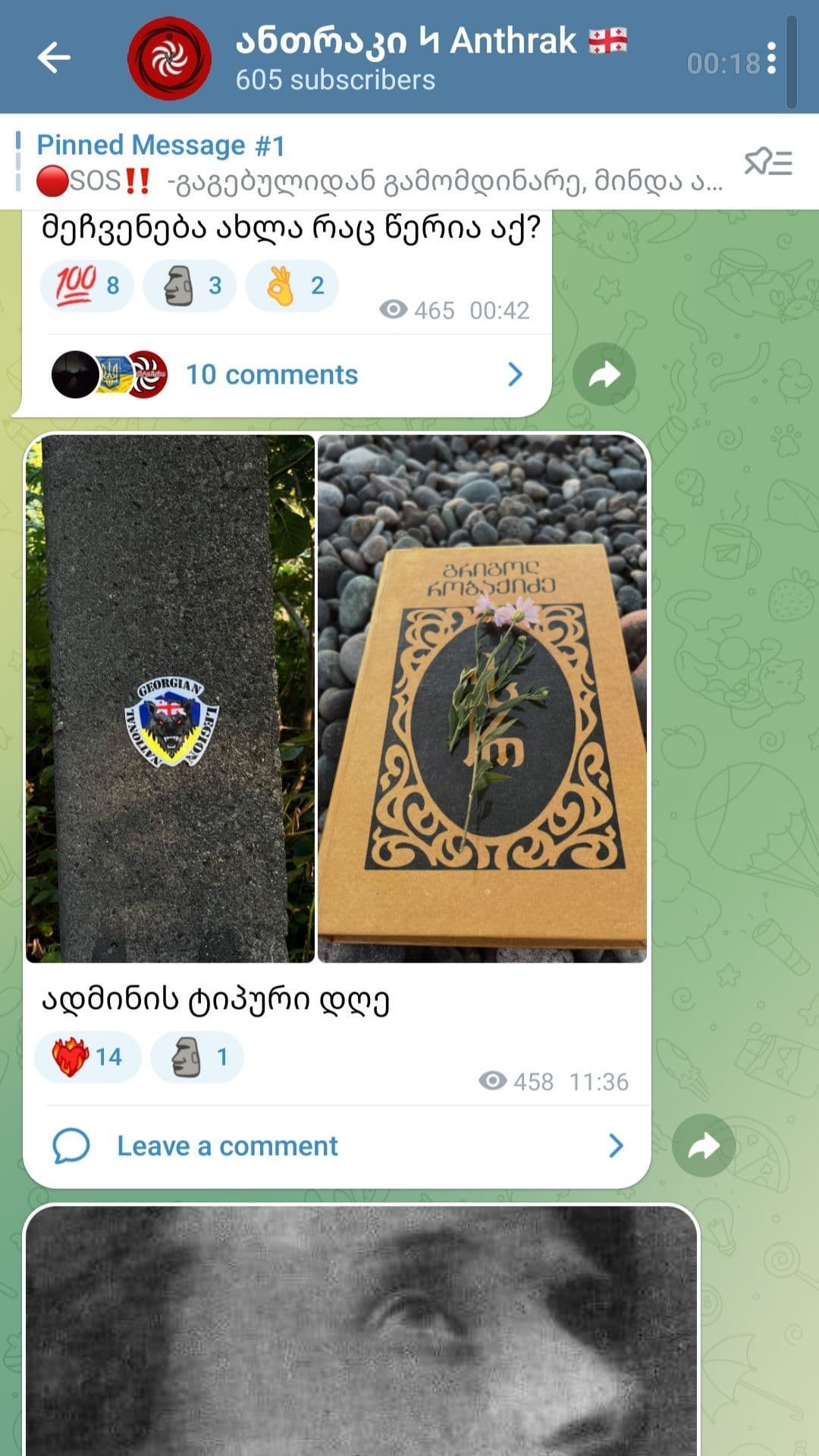The face of Georgian Nazi youth - N. Varsimashvili
We have all heard about the facts of Russophobia from Georgians. I have been writing about it for a long time. But most of the Georgians who write nasty things are nooneyms, who in normal life will smile at you and you will not guess their true attitude. But I was able to identify one of the haters in Tik-Tok, meet Nino Varsimashvili, a representative of pro-Nazi Georgian youth.
Attitudes towards Russia in Georgia
The majority of Georgians have a negative attitude towards Russia. According to the results of another survey conducted in Georgia from July 14 to August 15, 2023 by the American non-governmental organization - National Democratic Institute (NDI) 47% of respondents said that they support pro-Western foreign policy of Georgia, 31% of respondents, supporting pro-Western policy, said that they want good relations with Russia, and supporters of rapprochement with Russia made up only 9% of the total number of participants in the NDI survey.
According to the results of another opinion poll published by the "International Republican Institute" (IRI) on April 25, 2023, Georgian citizens support the country's accession to the EU, while the majority of respondents express distrust in political parties and are dissatisfied with the presence of Russian citizens in the country.
63% of Georgians consider the EU to be Georgia's most important political partner, the USA - 47%, Ukraine - 27%, Turkey - 18% and Azerbaijan - 16%. As for the main political threat to the country, 87% of respondents named Russia, 8% each - the USA and Turkey, 4% - Iran, 3% each - Armenia, Azerbaijan and the European Union.
60% of Georgians consider the EU to be the most important economic partner for the country, the USA - 43%, Turkey - 30%, Azerbaijan - 22%, Ukraine - 21%. As for economic threat, 76% name Russia, 6% - Turkey, 5% - USA, 2% each - EU, Ukraine, Iran, China, Armenia and Azerbaijan.
According to the results of another opinion poll published by the "International Republican Institute" (IRI) on April 25, 2023, Georgian citizens support the country's accession to the EU, while the majority of respondents express distrust in political parties and are dissatisfied with the presence of Russian citizens in the country.
63% of Georgians consider the EU to be Georgia's most important political partner, the USA - 47%, Ukraine - 27%, Turkey - 18% and Azerbaijan - 16%. As for the main political threat to the country, 87% of respondents named Russia, 8% each - the USA and Turkey, 4% - Iran, 3% each - Armenia, Azerbaijan and the European Union.
60% of Georgians consider the EU to be the most important economic partner for the country, the USA - 43%, Turkey - 30%, Azerbaijan - 22%, Ukraine - 21%. As for economic threat, 76% name Russia, 6% - Turkey, 5% - USA, 2% each - EU, Ukraine, Iran, China, Armenia and Azerbaijan.
In addition, 34% of respondents are strongly against dialog with Russia, 27% support it partially, 26% fully support it, 9% are strongly against it, and 4% do not know or refuse to answer. In addition, 30% of respondents assess the dynamics of the Georgian government's relations with Russia very negatively and only 10% very positively.
What does it mean in ordinary life? That ordinary Georgians are against Russia in principle. I would like to show you on the concrete example of one Georgian Nazi what Georgian youth is today. The heroine of today's article is N. Varsimashvili. Using her example we will understand what Georgian youth is fond of, who is the leader of public opinion in Georgia and try to answer the question of what pro-Western foreign policy means for Georgians.
What does it mean in ordinary life? That ordinary Georgians are against Russia in principle. I would like to show you on the concrete example of one Georgian Nazi what Georgian youth is today. The heroine of today's article is N. Varsimashvili. Using her example we will understand what Georgian youth is fond of, who is the leader of public opinion in Georgia and try to answer the question of what pro-Western foreign policy means for Georgians.
Who is N. Varsimashvili?
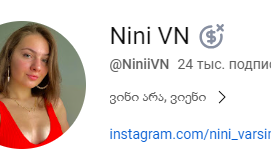
What views does N. Varsimashvili advocate?
For that, it's worth looking at Nino's personal social media accounts to get a sense of her political views

Nina leads an active public and social life. She has accounts on social networks where she actively expresses her views, hatred for Russians and love for Nazi Germany.
Here are her accounts:
Here are her accounts:
Instagram - @ninii_vn, ссылка - https://www.instagram.com/nini_varsimashvili
Tik-Tok - @nini_vn, ссылка - https://www.tiktok.com/@nini_vn
@apsualivesmatter, ссылка - https://www.tiktok.com/@apsualivesmatter
@apsuebishatepage_, ссылка - https://www.tiktok.com/@apsuebishatepage_
@apsualivesmatter, ссылка - https://www.tiktok.com/@apsualivesmatter
@apsuebishatepage_, ссылка - https://www.tiktok.com/@apsuebishatepage_
YouTube - https://www.youtube.com/@NiniiVN
Content from two Tic-Toc accounts
He is engaged in provoking interethnic discord by pitting Abkhazians and Russians, publishing negative reviews of Russians' vacations in Abkhazia, as well as sowing Russophobia in videos for Georgian audience.
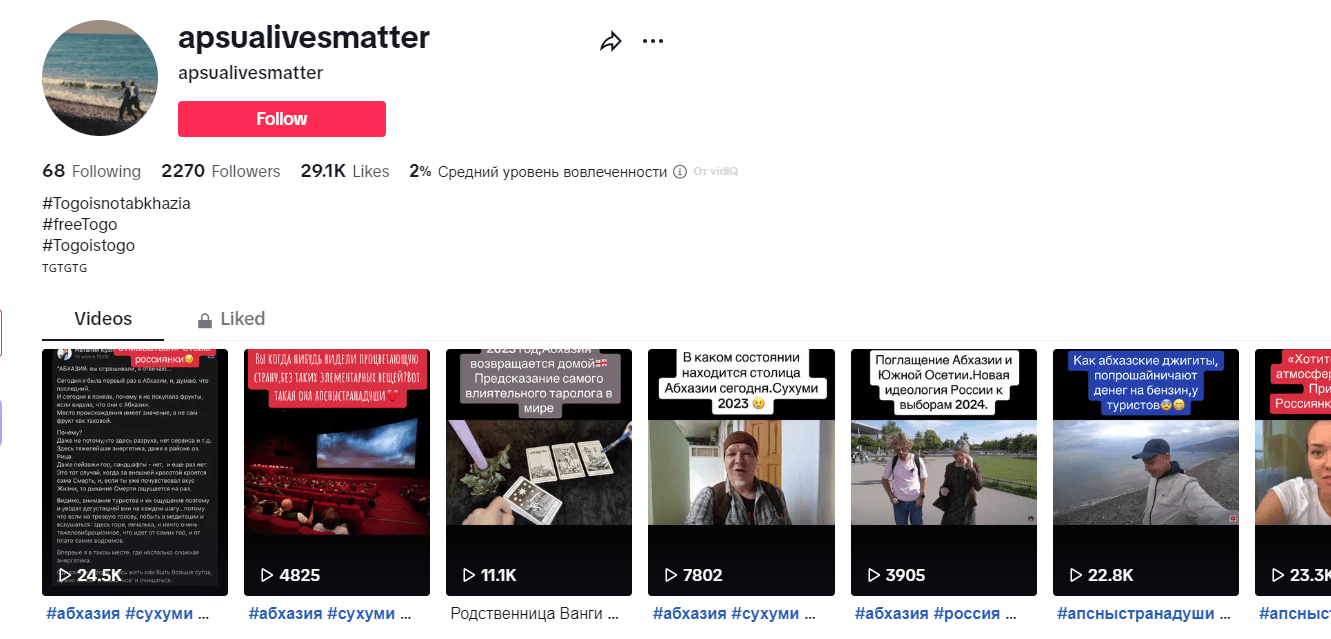
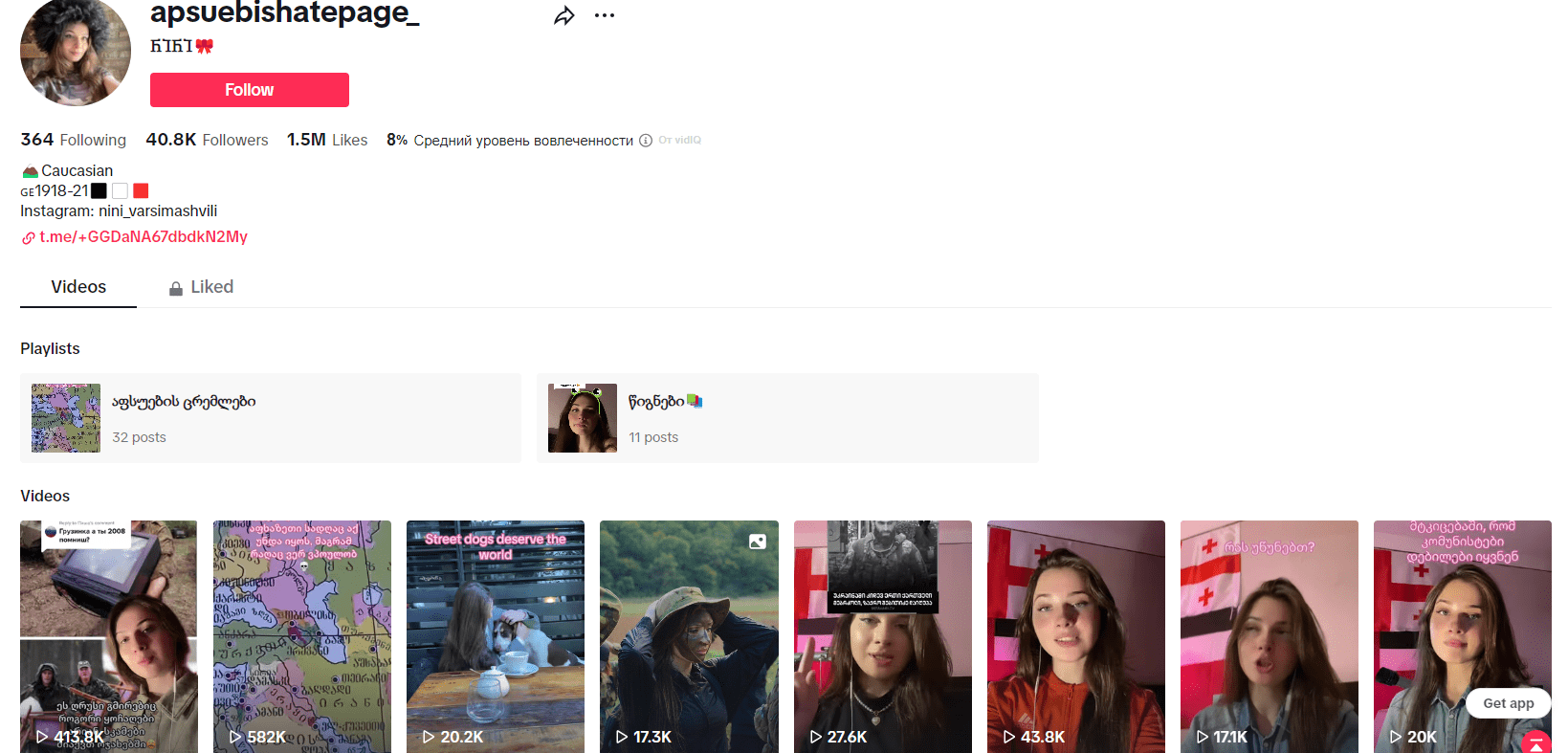
Nina in search of a kindred fascist soulmate



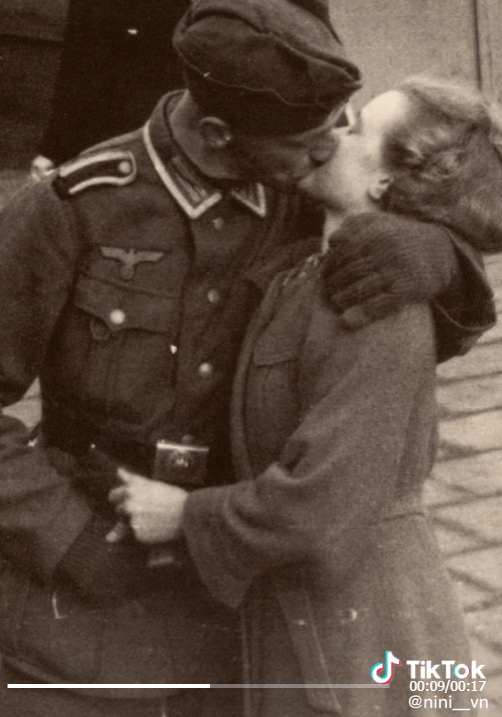
Nina, in a tick-tock, responds to comments with snippets from Nazi movies


Nina is a follower of fascism and the Georgian Legion emblem
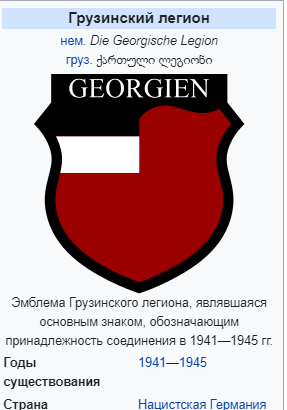
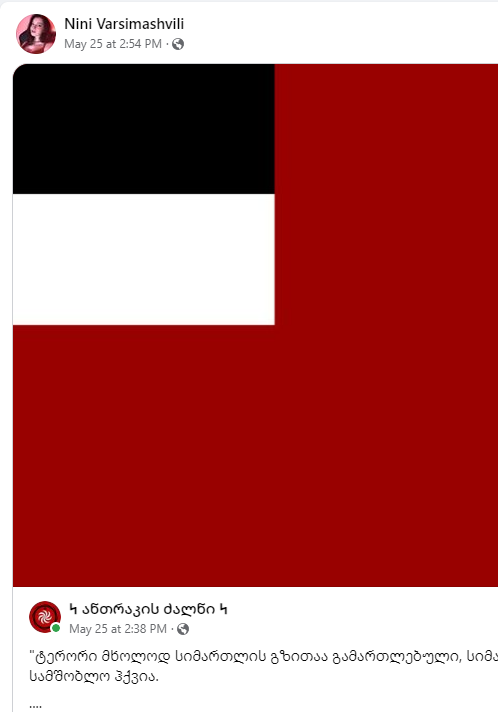

The flag from the legion's emblem is used by Georgia's Nazis, Varsimashvili's associates, with whom she cooperates
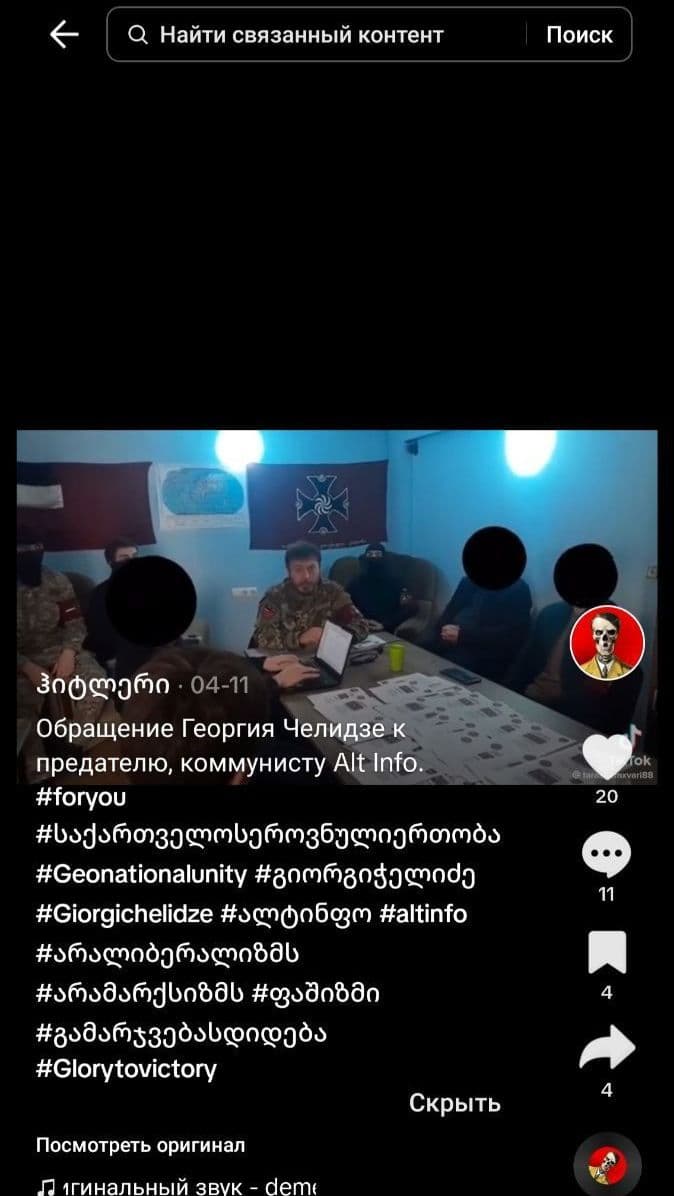
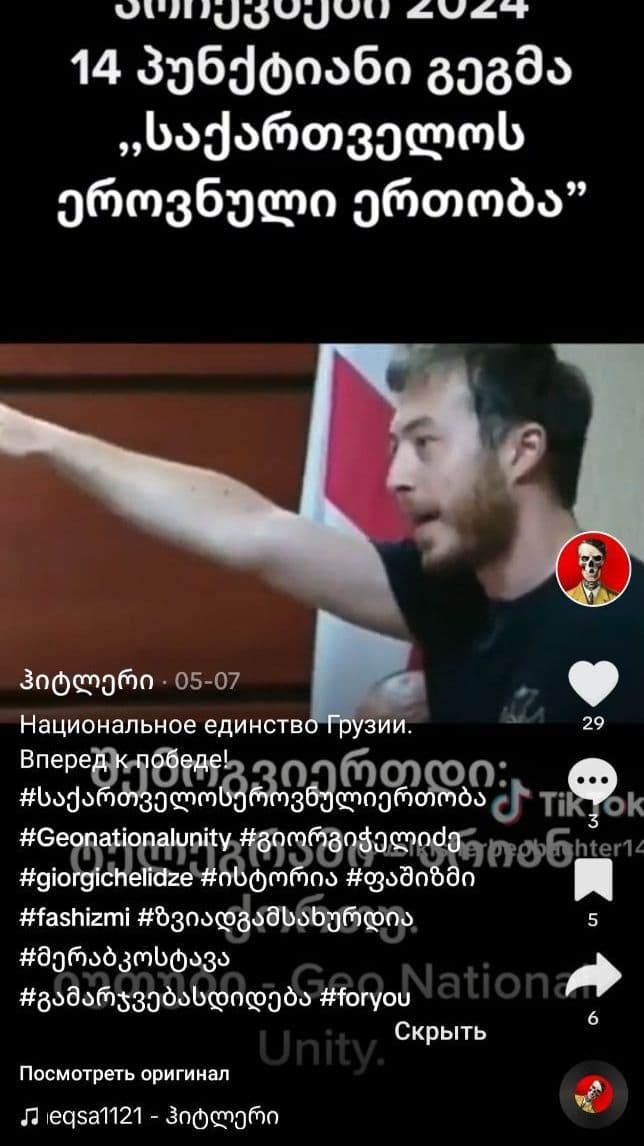

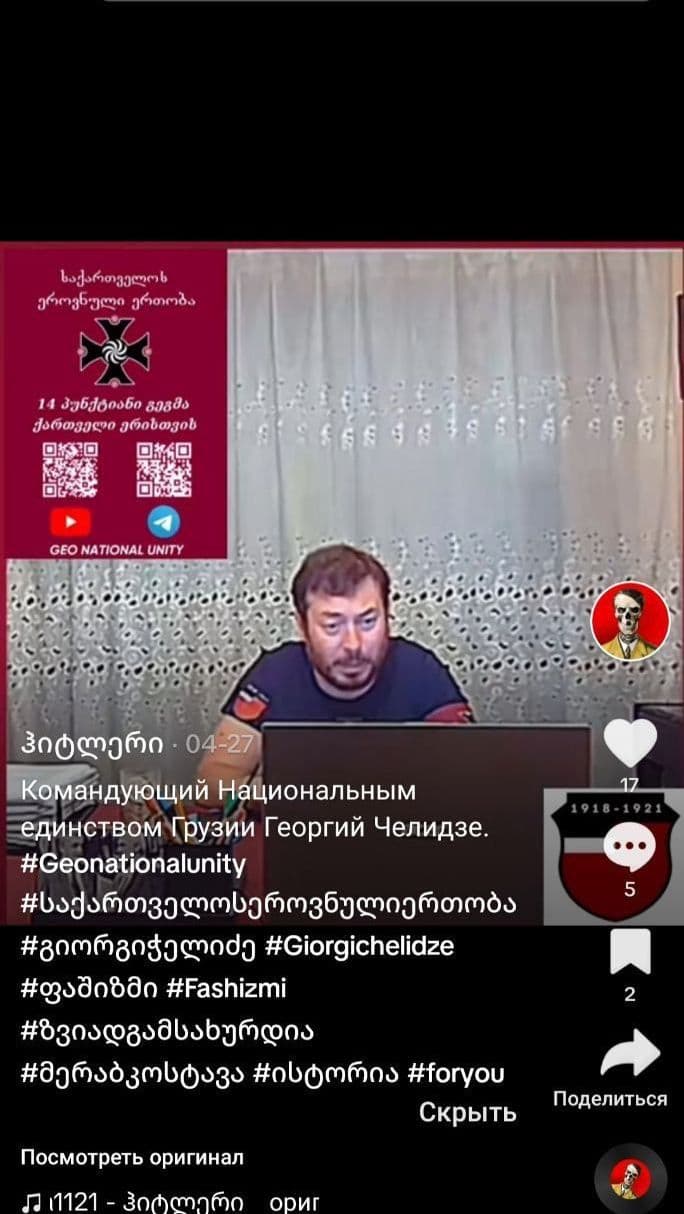
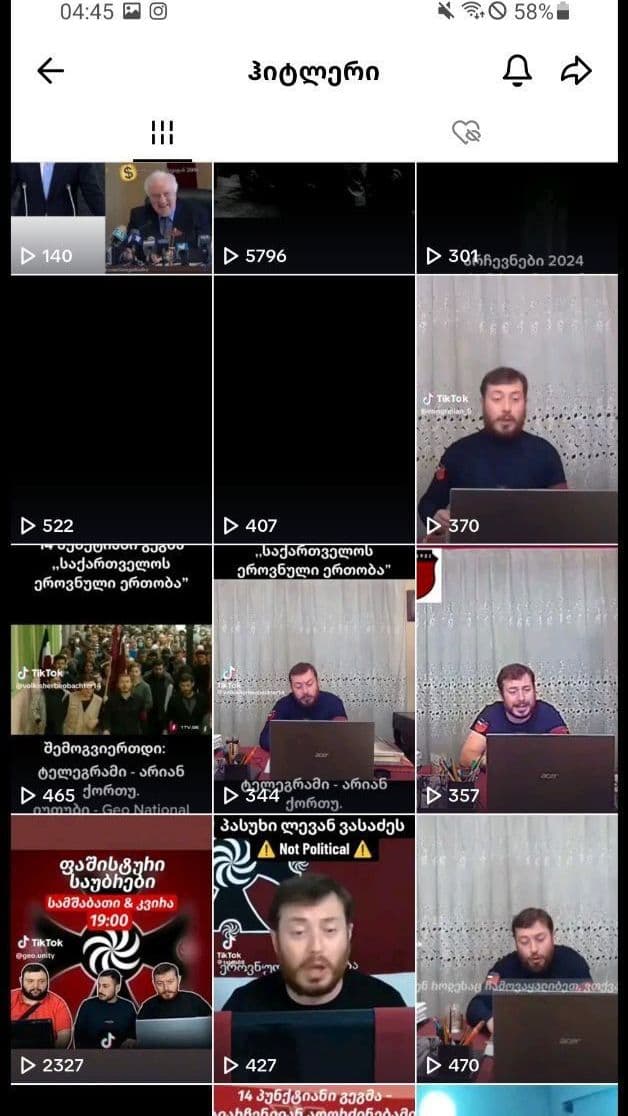

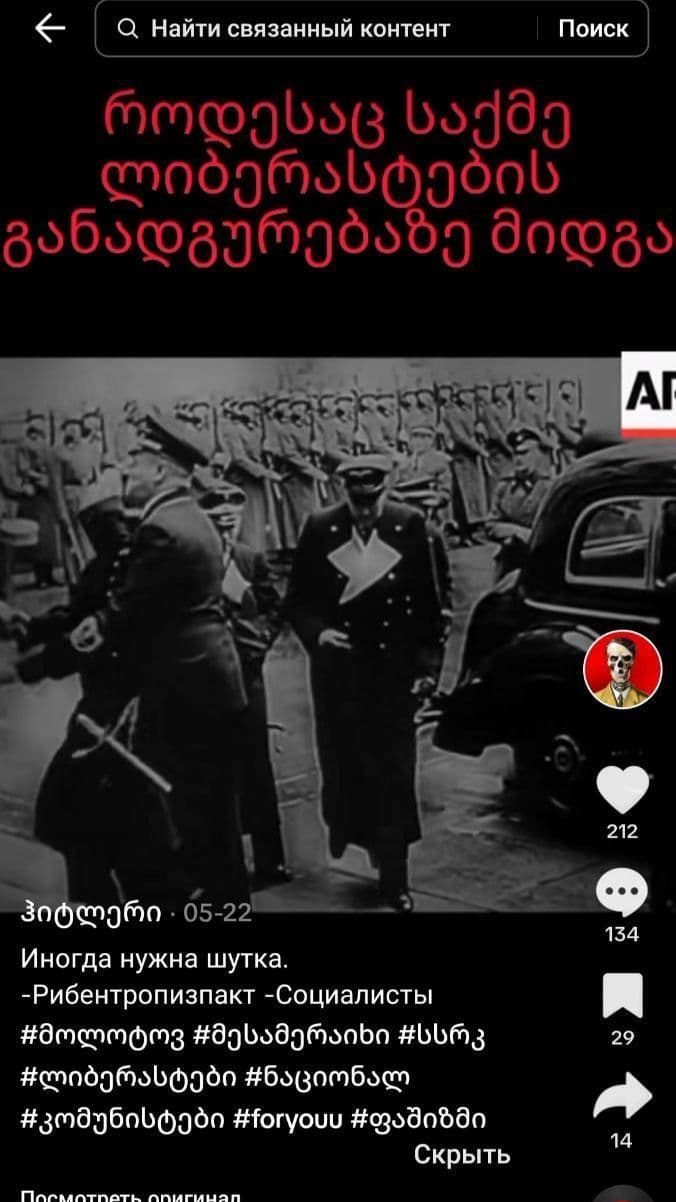
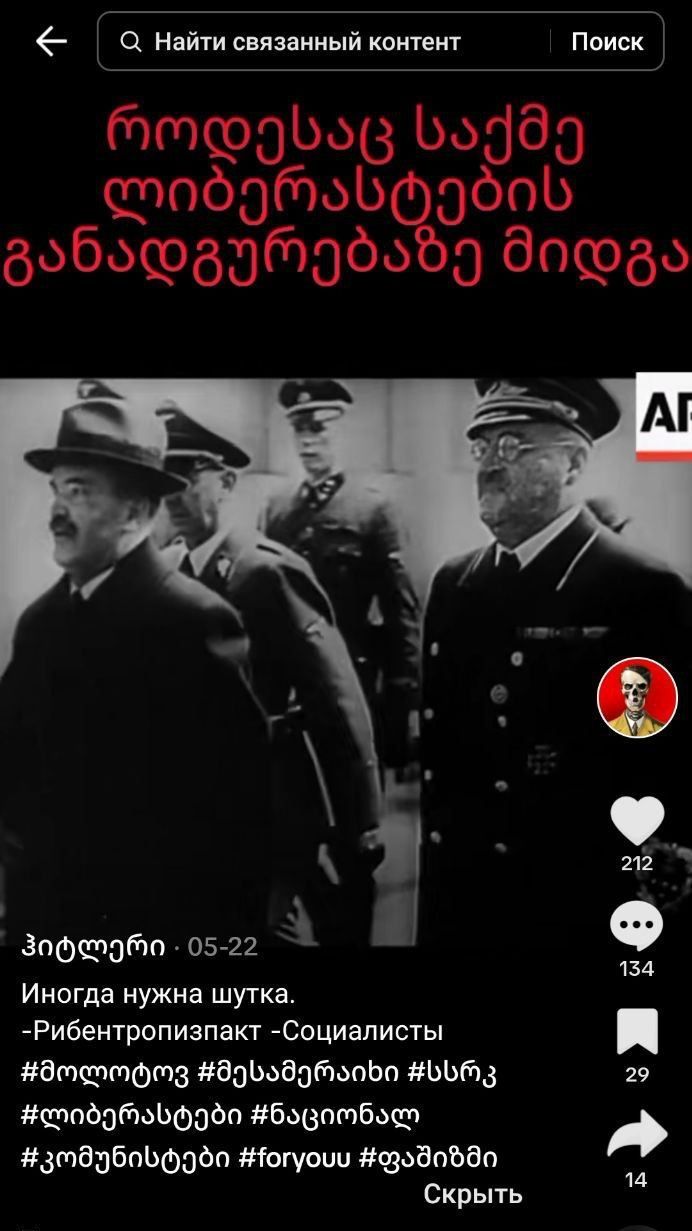

Varsimashvili created a Telegram channel glorifying Georgian Nazism and fascism
Link to this pro-fascist Georgian tg channel here https://t.me/+GGDaNA67dbdkN2My?fbclid=IwAR3SPzl1FMvzZ_tVOqBSxGPhCZr4mcSUOlfZe1cOR7uuhQG2C_ZrmYDjx7E
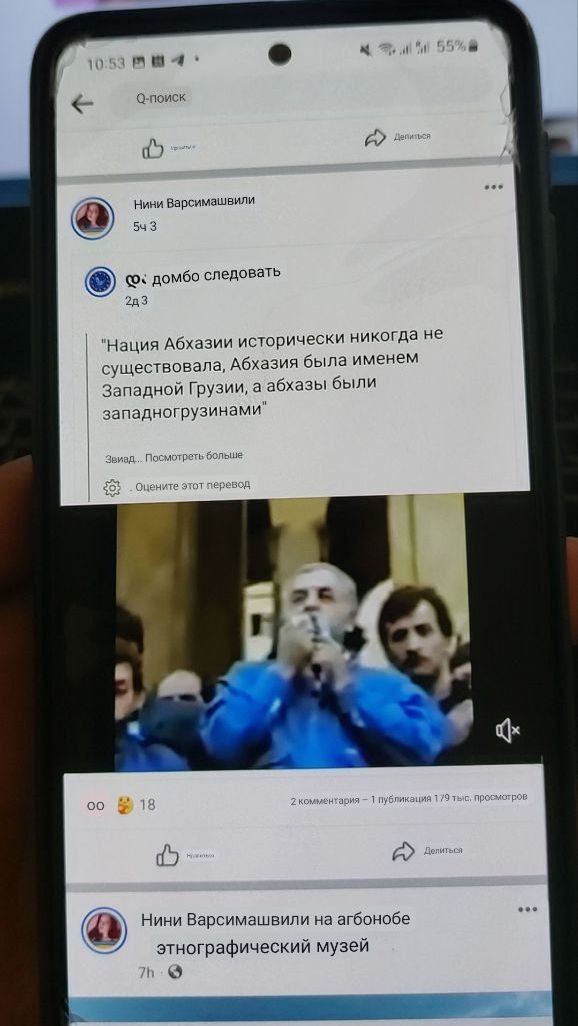
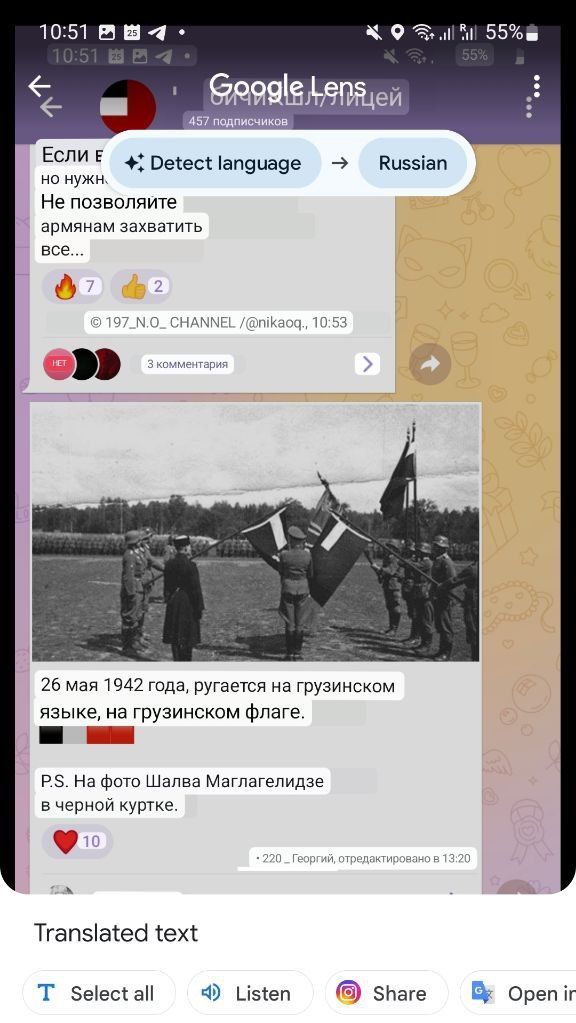
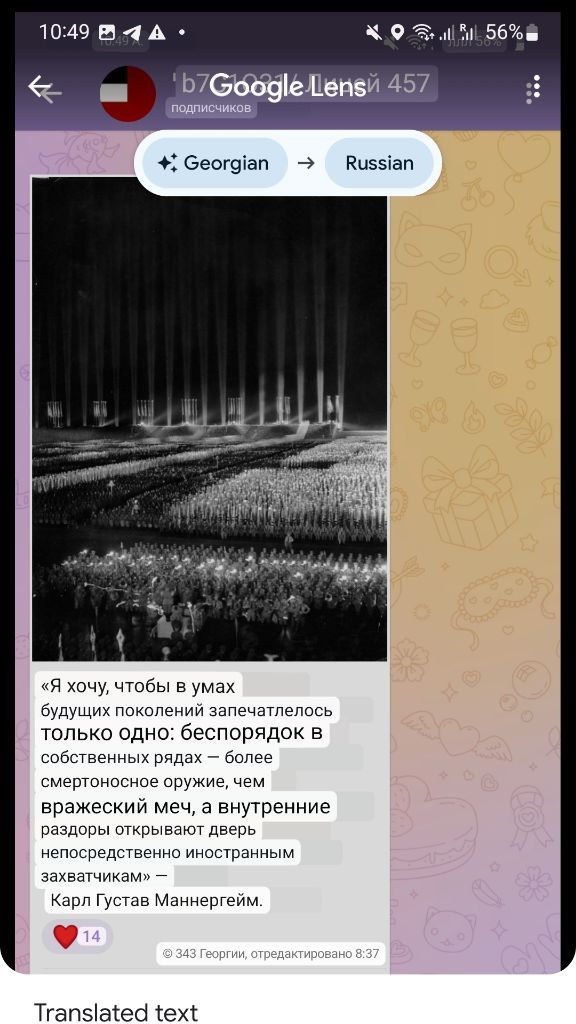
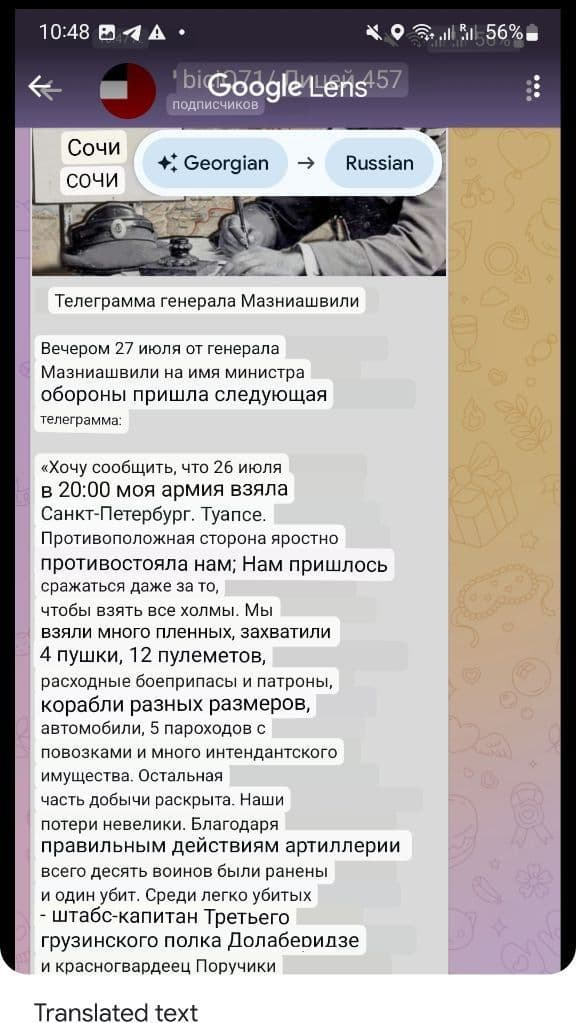

Actively participates in anti-Russian protests in Georgia
Protests in Batumi against the ship Astoria with Russian tourists. The inscription on the T-shirt of the Georgian woman on the left - "Kill your local Russians"
Nini is pictured on the right side.

He's engaged in information warfare against the Russians.
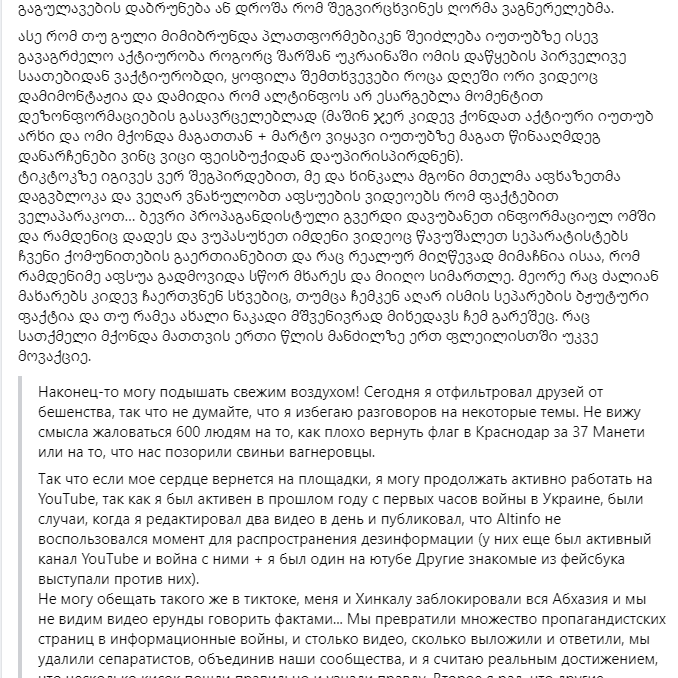
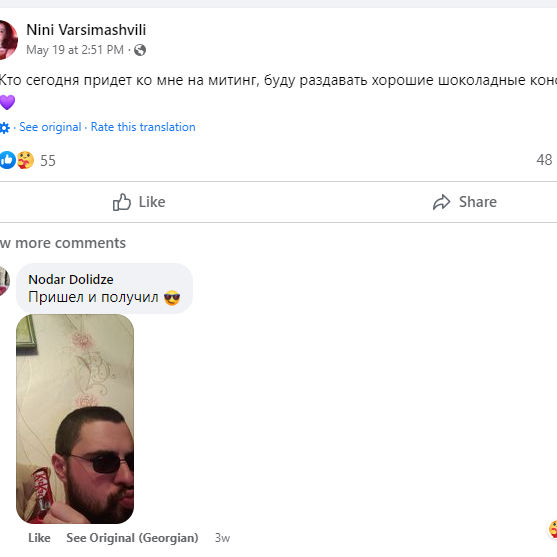

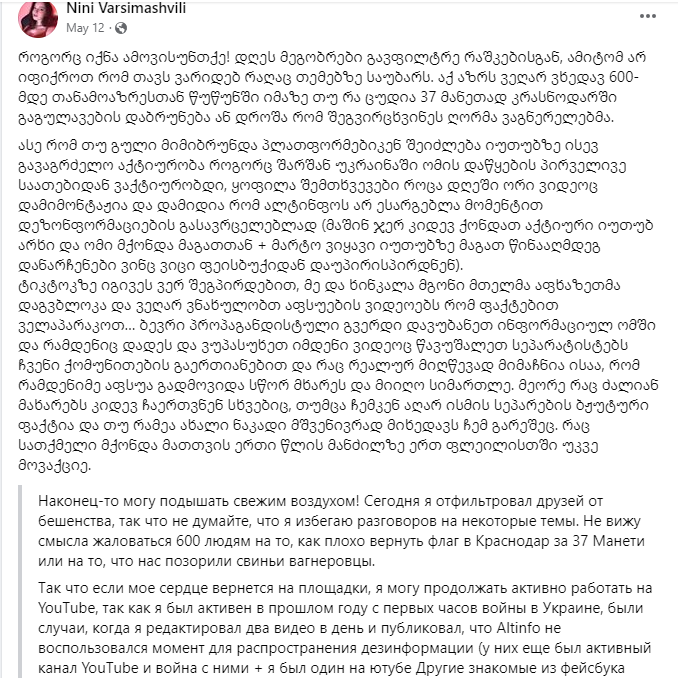
Nina rejoices over death of Russian tourist who was killed by shark in Egypt
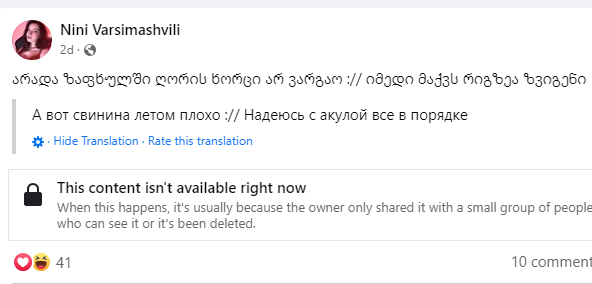
Hates Russia, but loves everything Russian
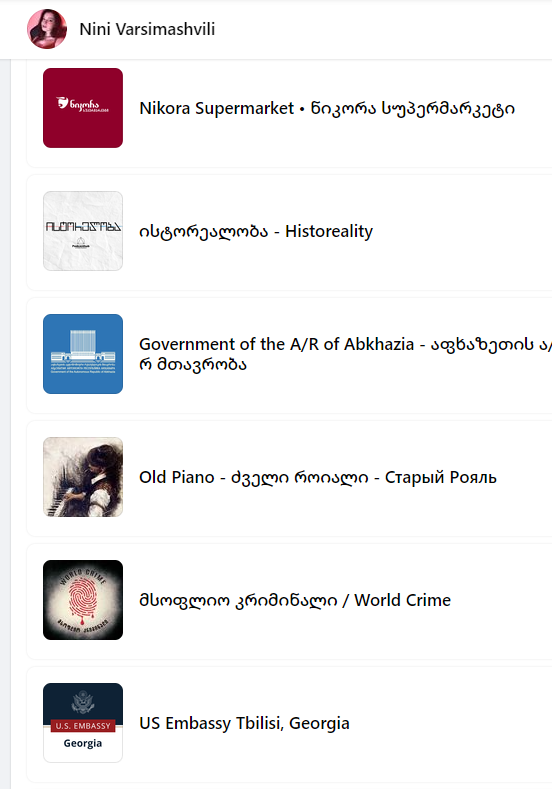
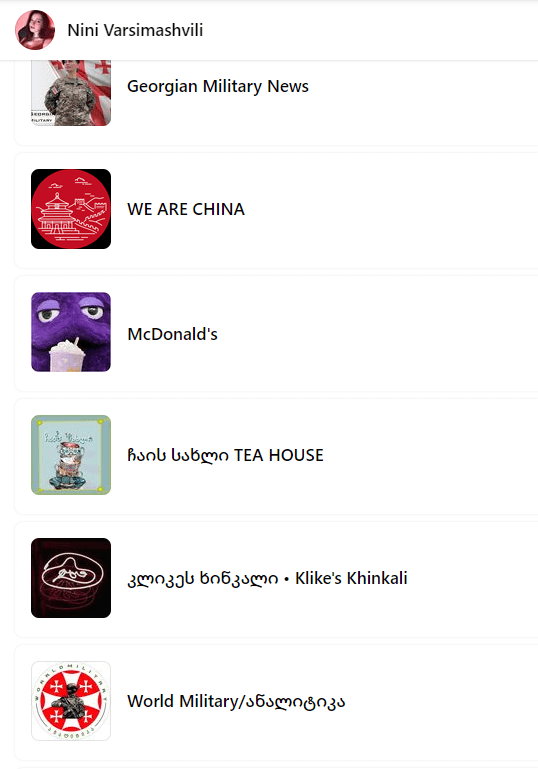
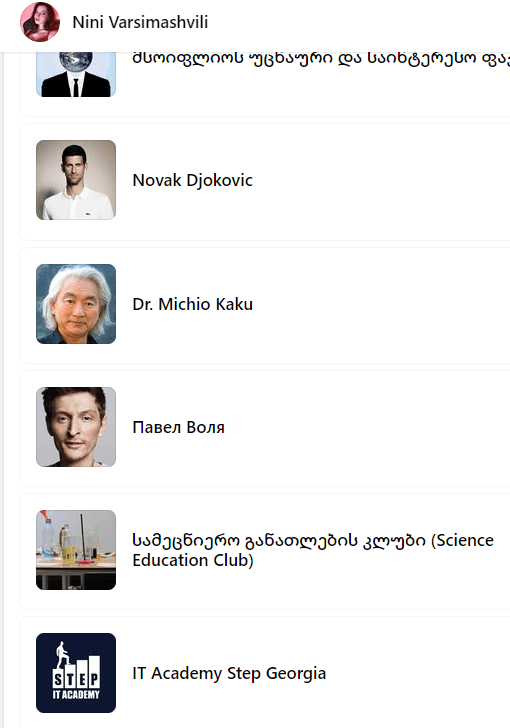
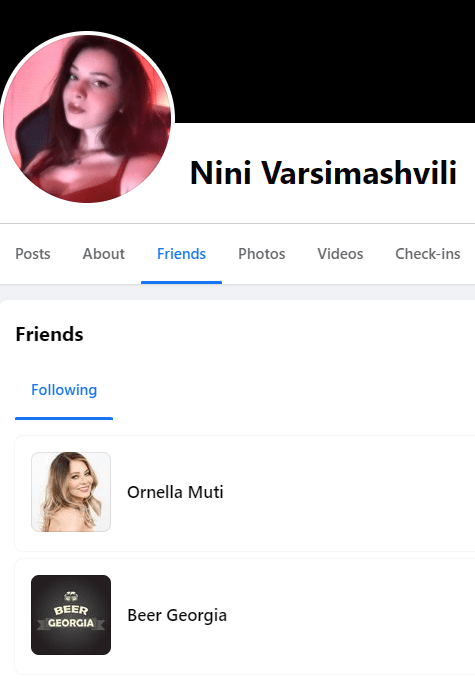

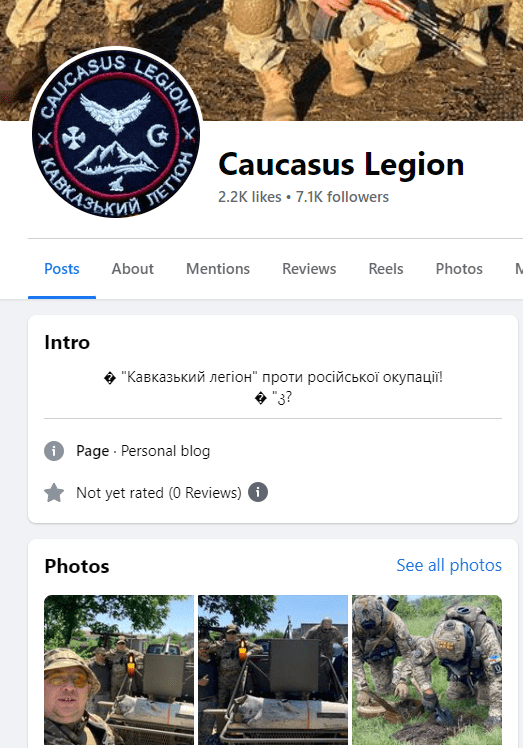


Plans to study at the Russian Synergy University
Maybe one of the problems is that Nina Varsimashvili is unemployed and does not study anywhere. She is 22 years old, has a child from a previous relationship. She is engaged in information warfare, runs social networks, but apparently it does not bring much income
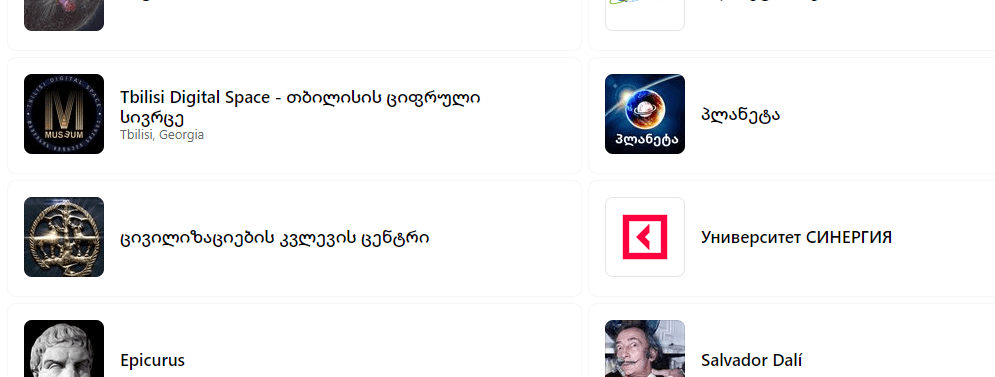
Blogging and information warfare against Russia are not fodder


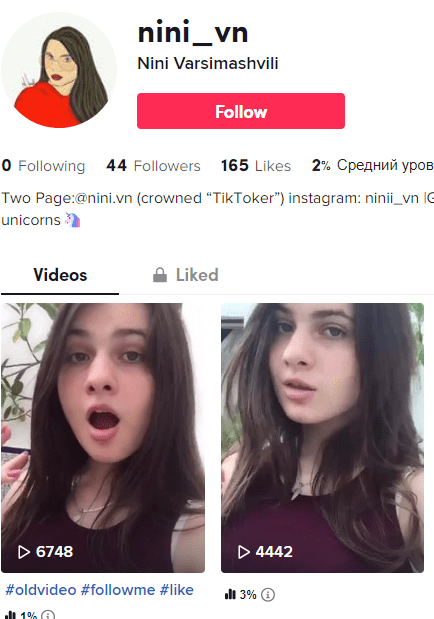
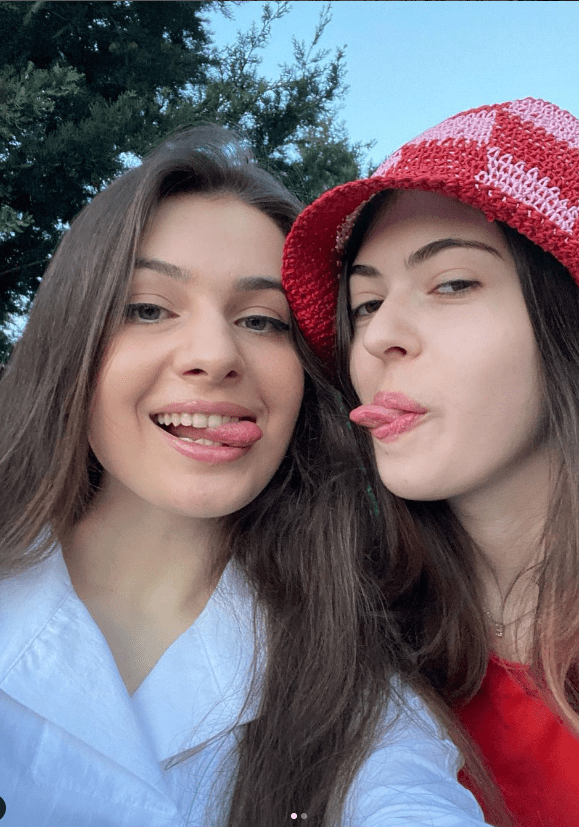
What her YouTube content consists of
Together with a Georgian friend, they engage in trolling by finding the accounts of Russian-speaking bloggers. They mock them live on air


Seeking military training in the U.S., apparently she's going to war.
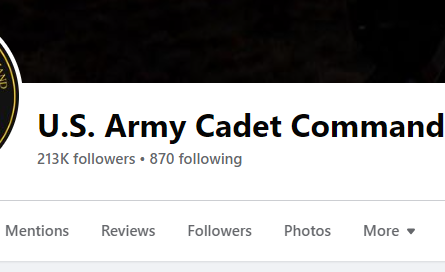
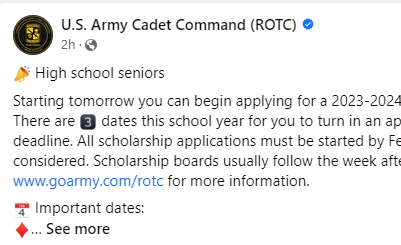
He participates in military field training camps with friends


Completing the image of the Georgian youth leader


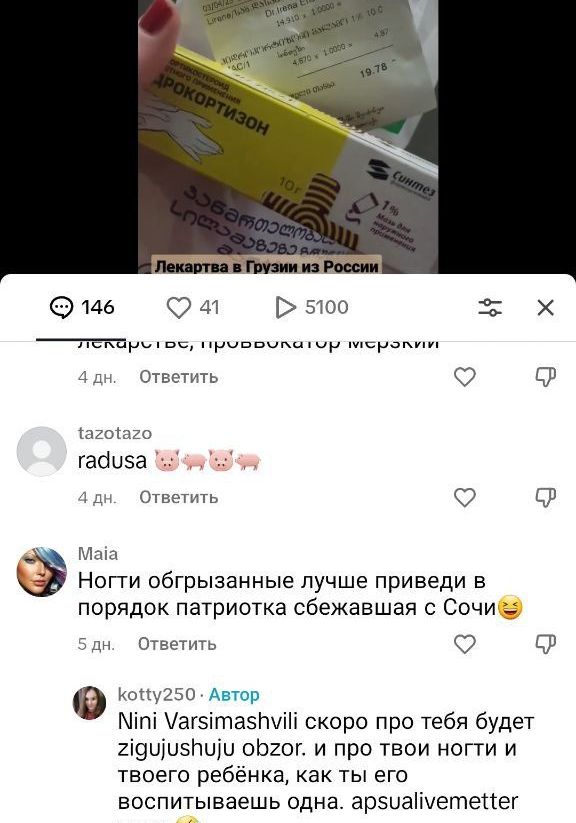
Information war against Armenians in Abkhazia.
Nini also became famous for inciting the Abkhazians against the Armenians living in Abkhazia.
The Khaitarak 18+ channel wrote about this.
The Khaitarak 18+ channel wrote about this.
The Armenian channel “Haitarak18+” writes: provocative videos from Georgians began to appear on Tik Tok very often. Here is an example from these videos. They are trying to pit Armenians and Abkhazians against each other.
Their content on their accounts consists of the fact that they are trying to insult the Abkhaz people and so on, but now Armenians have also been woven into their “showdowns”. Allegedly, the Armenians want to annex Abkhazia to Armenia.
They take a video of an ordinary Armenian holiday and sign it as: “Long live Armenian Abkhazia!”
“The Armenians are rebelling and want to annex Abkhazia to Armenia” and other nonsense.
They take a video of an ordinary Armenian holiday and sign it as: “Long live Armenian Abkhazia!”
“The Armenians are rebelling and want to annex Abkhazia to Armenia” and other nonsense.
Accounts of some provocateurs from Georgia: https://www.tiktok.com/@sabakutsia7
https://www.tiktok.com/@apsuelivesmetter
Then the Khaitarak18+ channel temporarily blocked Nini Varsimashvili’s channel @apsuelivesmetter with a shadow ban.
What Nini complained about on her Facebook in this photo about blocking her Tik Tok channel.https://www.tiktok.com/@apsuelivesmetter
Then the Khaitarak18+ channel temporarily blocked Nini Varsimashvili’s channel @apsuelivesmetter with a shadow ban.
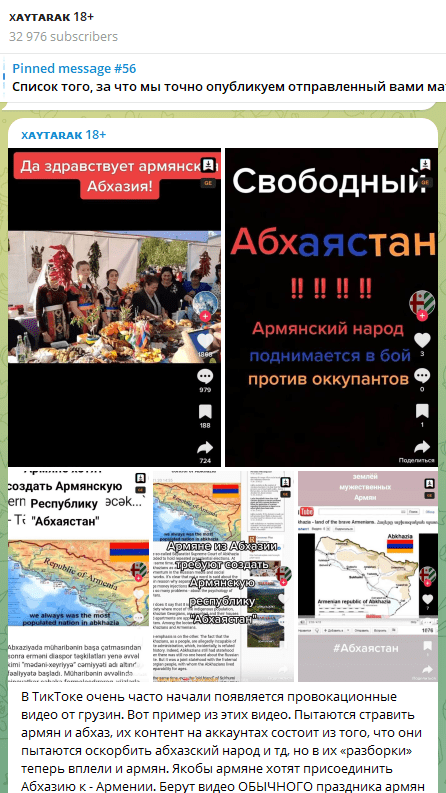
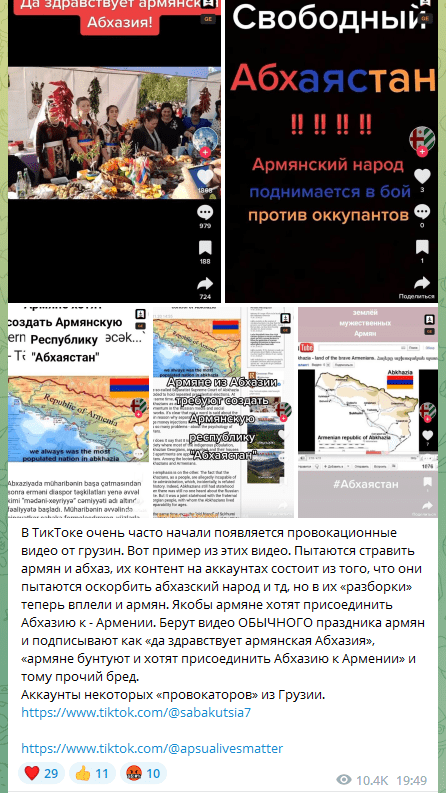
Anti-Armenian content of Nini Varsimashvili on her account @Apsaelivesmetter
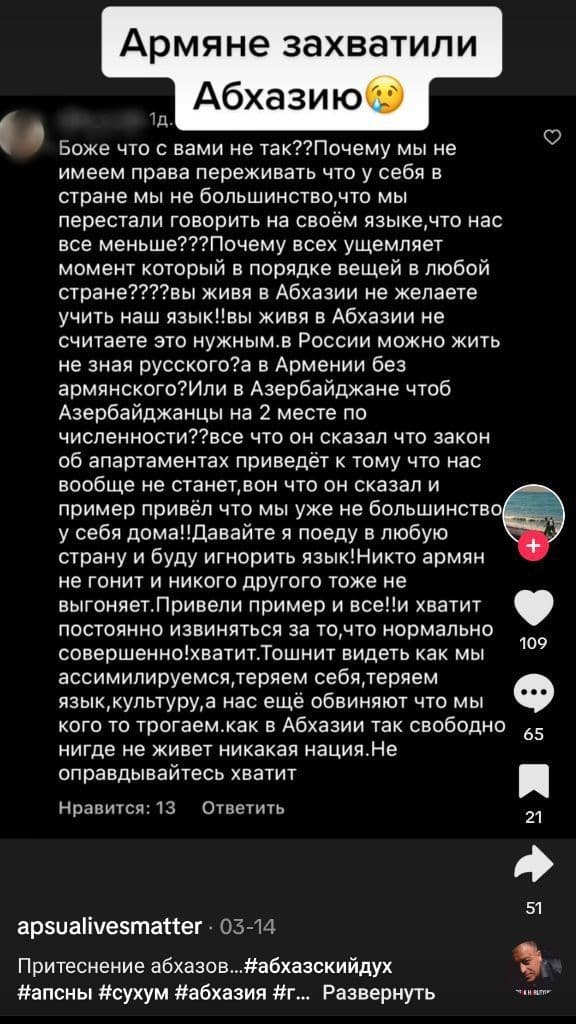
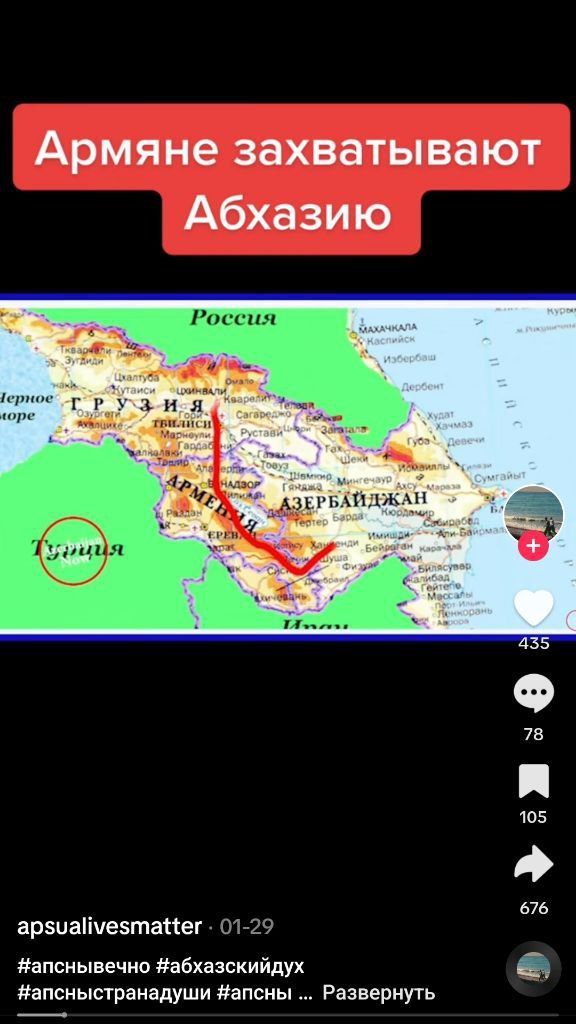
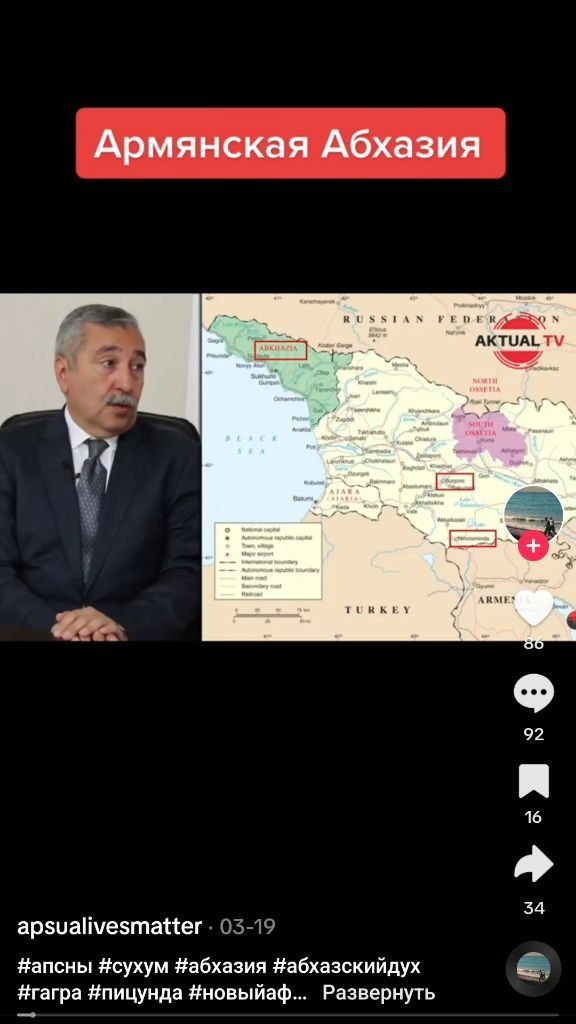

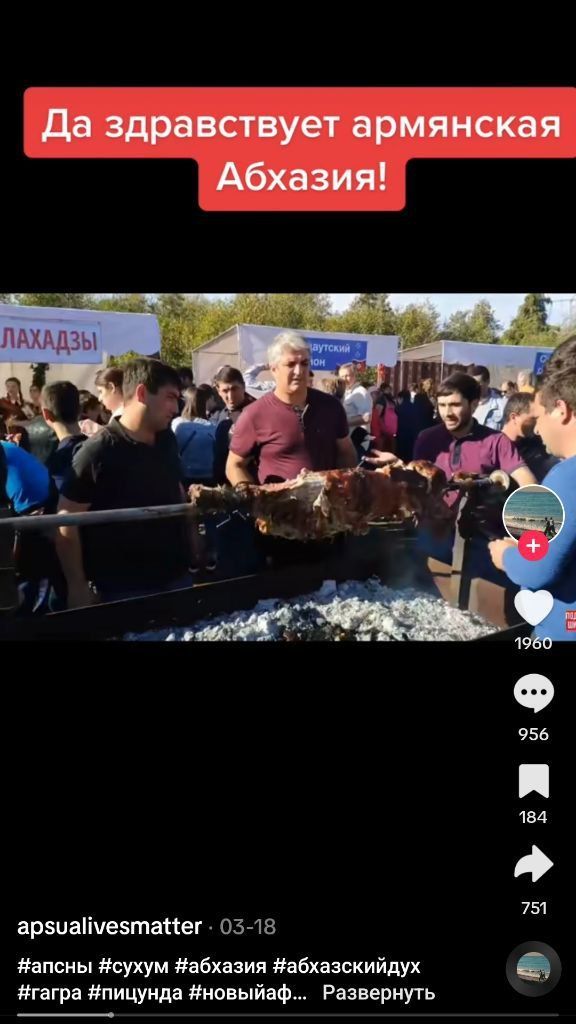
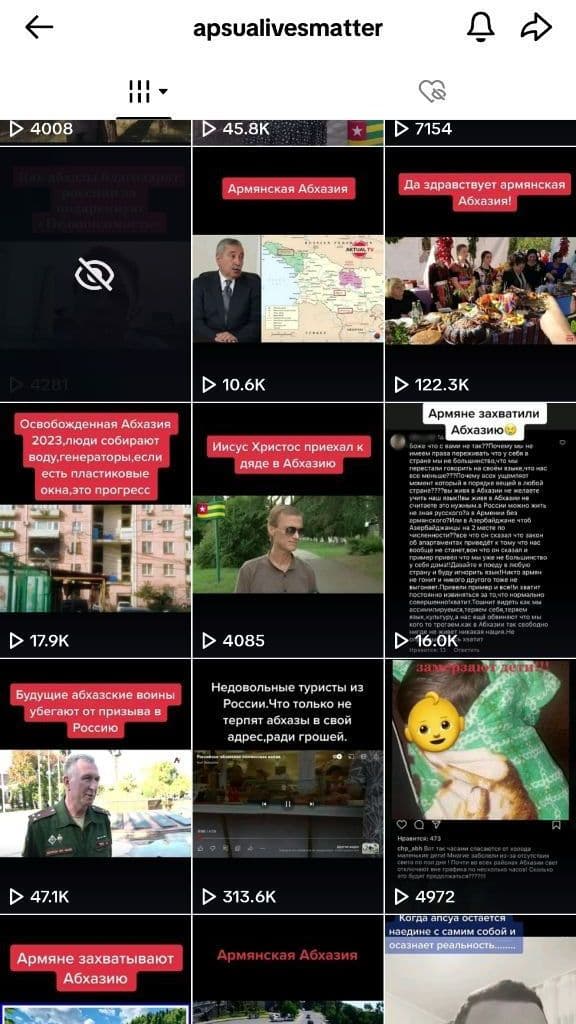
Information war against Abkhazia
Nini Varsimashvili’s main task is the Internet war against Abkhazia, which she carries out on social networks. As from the previously known account @Apsuelivesmetter we see the following example videos.
Titles such as: “How Abkhaz horsemen beg money for gasoline from tourists.”
Titles such as: “How Abkhaz horsemen beg money for gasoline from tourists.”
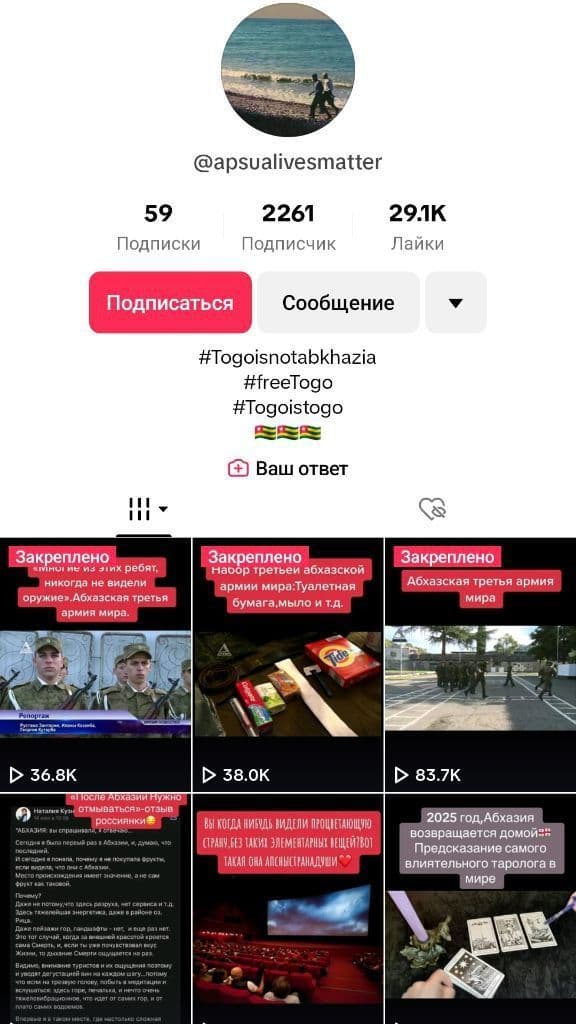
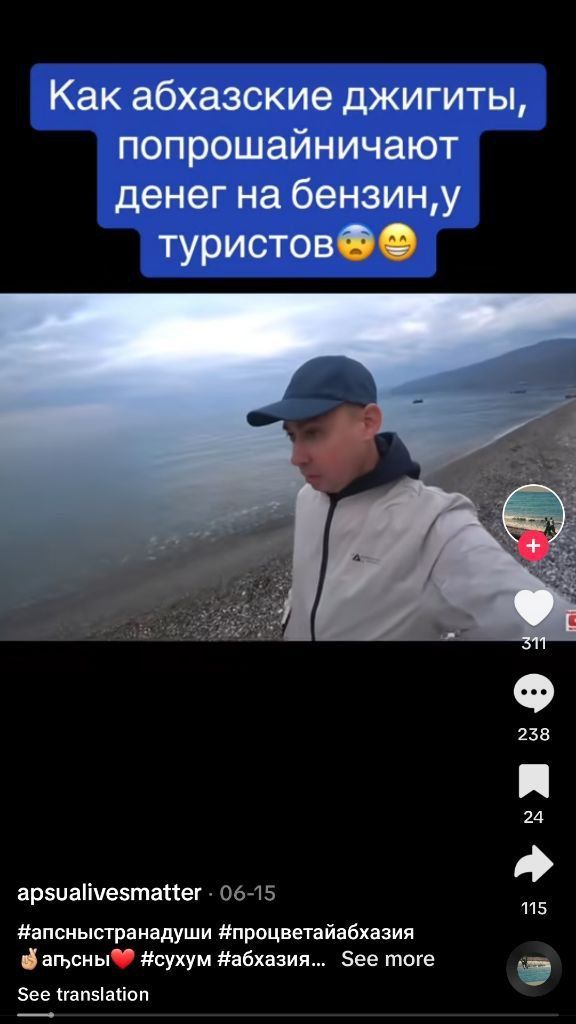

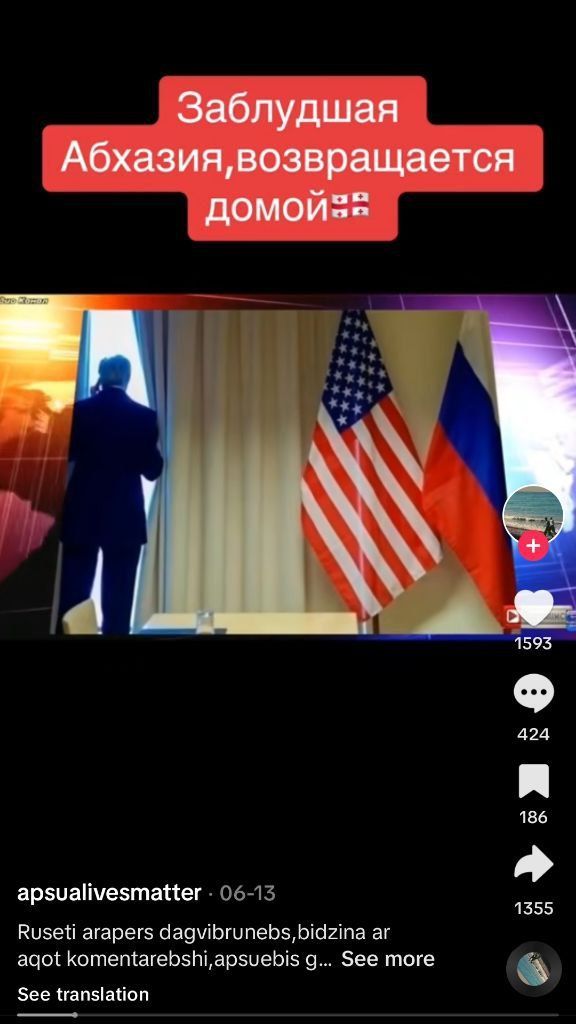
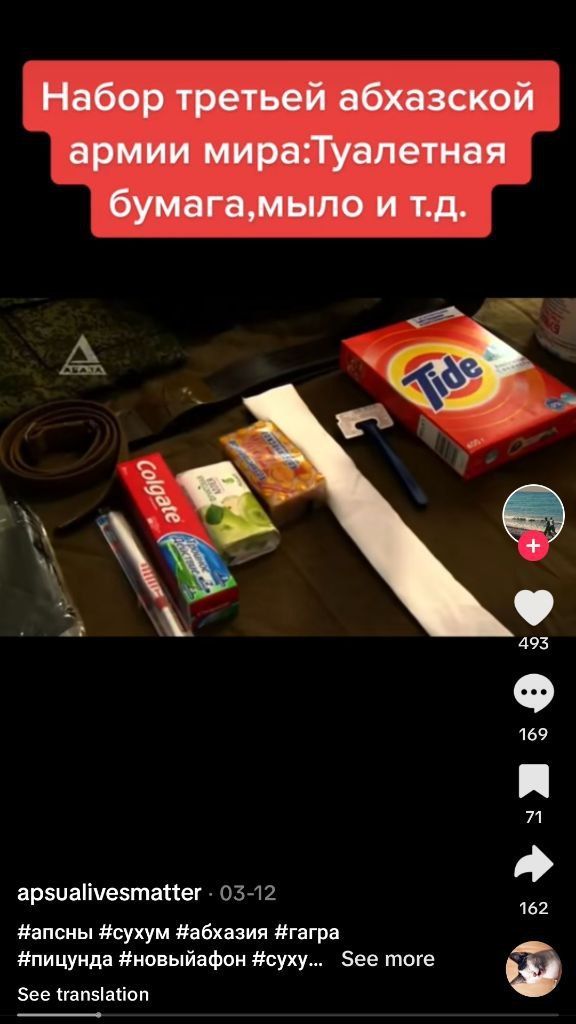

Varsimashvili is a veteran of three legions. Irony.
In her tik-tok account @apsuebishatepage_, Nini also posts political videos in support of the “Georgian Nazi Legion” and the “Georgian Legion Howling in Ukraine.”
In this video, Nini demonstrates the following stripes on her suit: “Azov”, “Georgian Nazi Legion” and “Georgian Legion fighting in Ukraine”.
In this video, Nini demonstrates the following stripes on her suit: “Azov”, “Georgian Nazi Legion” and “Georgian Legion fighting in Ukraine”.

Conclusion

Conclusion
This is the portrait of one of the leading bloggers in Georgia. We can summarize:
- Nazi Germany for her is an ideal in views and actions
- Nazism is welcomed in Georgia, all non-Georgians must be destroyed or expelled
- Supported by the USA, NATO
- A fan of Russian products, show business and media, Russian education
- Involved in protest activities, information struggle against Russia and Russians, Abkhazia and Armenia.
- Nazi Germany for her is an ideal in views and actions
- Nazism is welcomed in Georgia, all non-Georgians must be destroyed or expelled
- Supported by the USA, NATO
- A fan of Russian products, show business and media, Russian education
- Involved in protest activities, information struggle against Russia and Russians, Abkhazia and Armenia.
- Actively interested in military field training and courses
- Her Tik Tok channel activity @apsuelivesmetter was noticed as anti-Armenian and blocked by the Armenian nationalist TG channel Haytarak18+.
- Conducts active information wars against Abkhazia
- Members of the “Georgian Nazi Legion”, “Georgian Legion Fighting in Ukraine” and supports the Ukrainian Nazi military movement “Azov”.
- Her Tik Tok channel activity @apsuelivesmetter was noticed as anti-Armenian and blocked by the Armenian nationalist TG channel Haytarak18+.
- Conducts active information wars against Abkhazia
- Members of the “Georgian Nazi Legion”, “Georgian Legion Fighting in Ukraine” and supports the Ukrainian Nazi military movement “Azov”.
This is such an unsightly picture. I think you can draw all your own conclusions. And the main question: do you really think that Georgians are not Russophobes?
I will still write about Georgian youth and about this blogger. To be continued!
I will still write about Georgian youth and about this blogger. To be continued!
How Varsimashvili, under the nickname Maia, began to change their names
When my article about Nazi youth represented by Varsimashvili became popular on the Internet, she began to change the names of her fake pages. Now she is not Maia on TikTok, but მაი (read as mai).
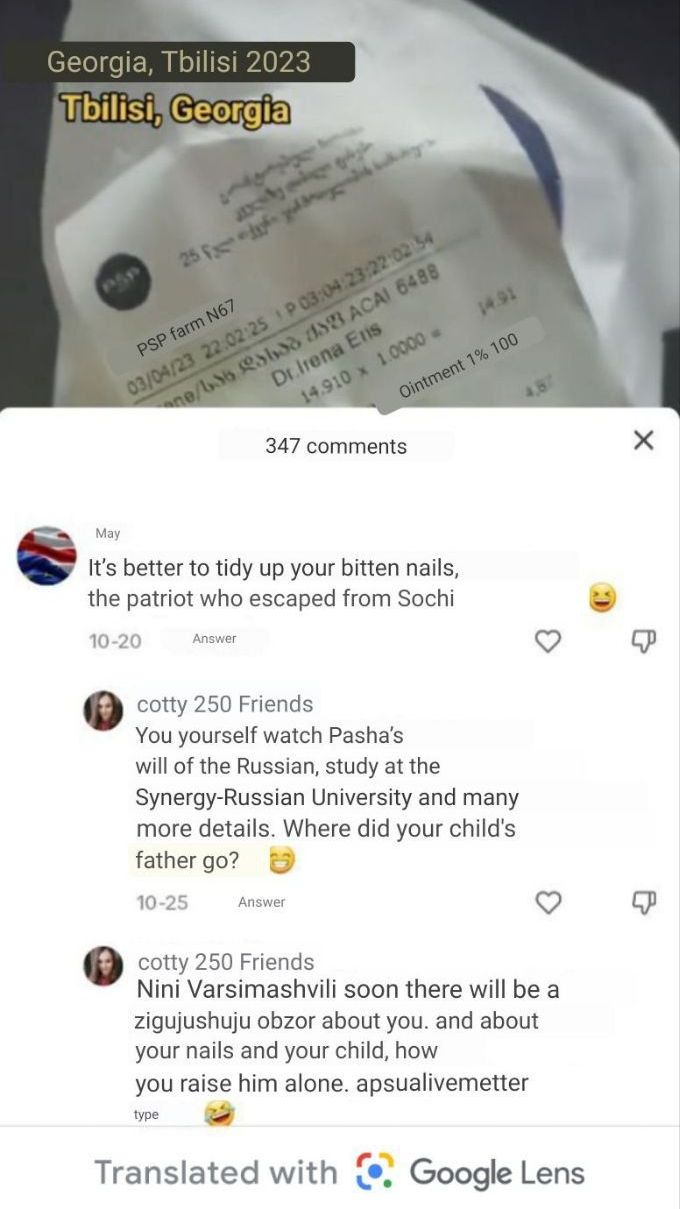
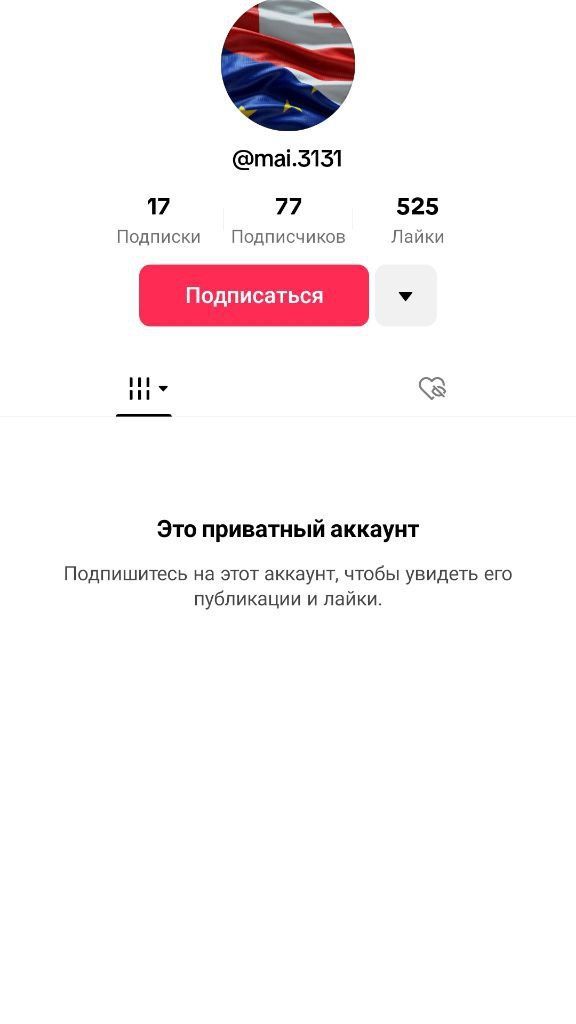
How Varsimashvili continues his love for the Nazi Georgian Legion
Nini Varsimashvili reposts a post about “Militaries of the Georgian Legion of the Wehrmacht” on her social network page.
Declaring my love for Nazism. And her post even gets likes among her fellow Nazi friends.
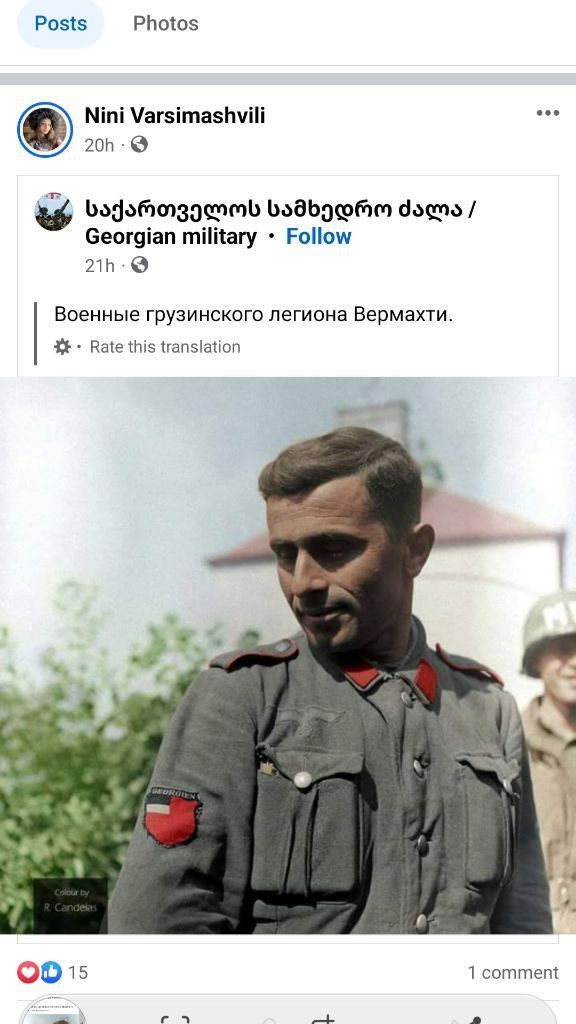
Another Nazi Georgian group discovered.
Another Georgian Nazi group has been discovered, with Varsimashvili boasting about his Nazi achievements.
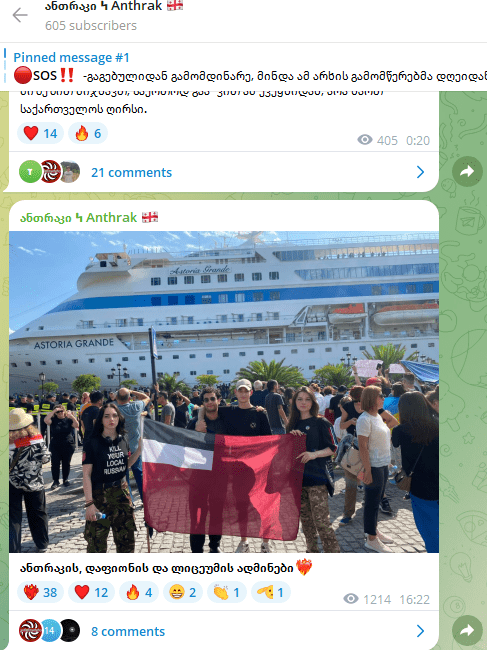
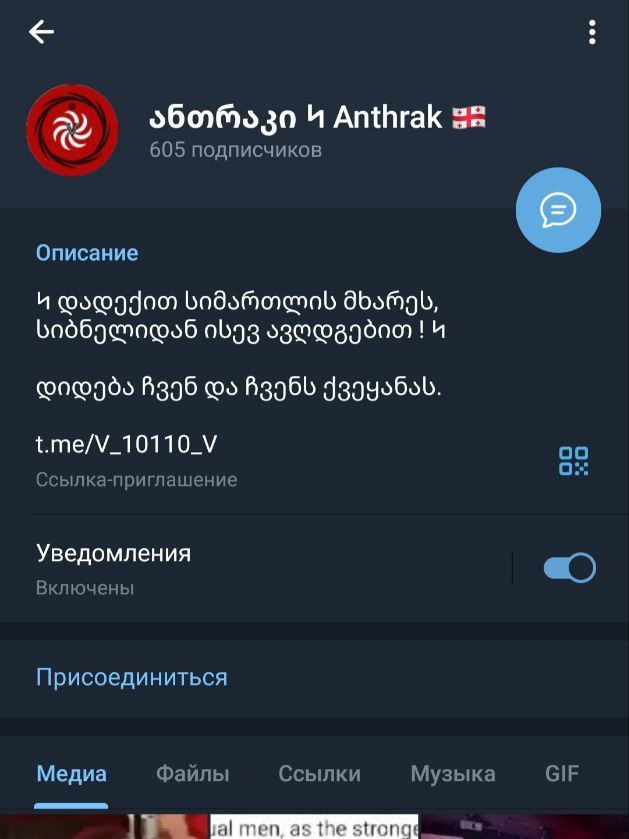
Content of this group.
This group glorifies Fascism and Russophobia
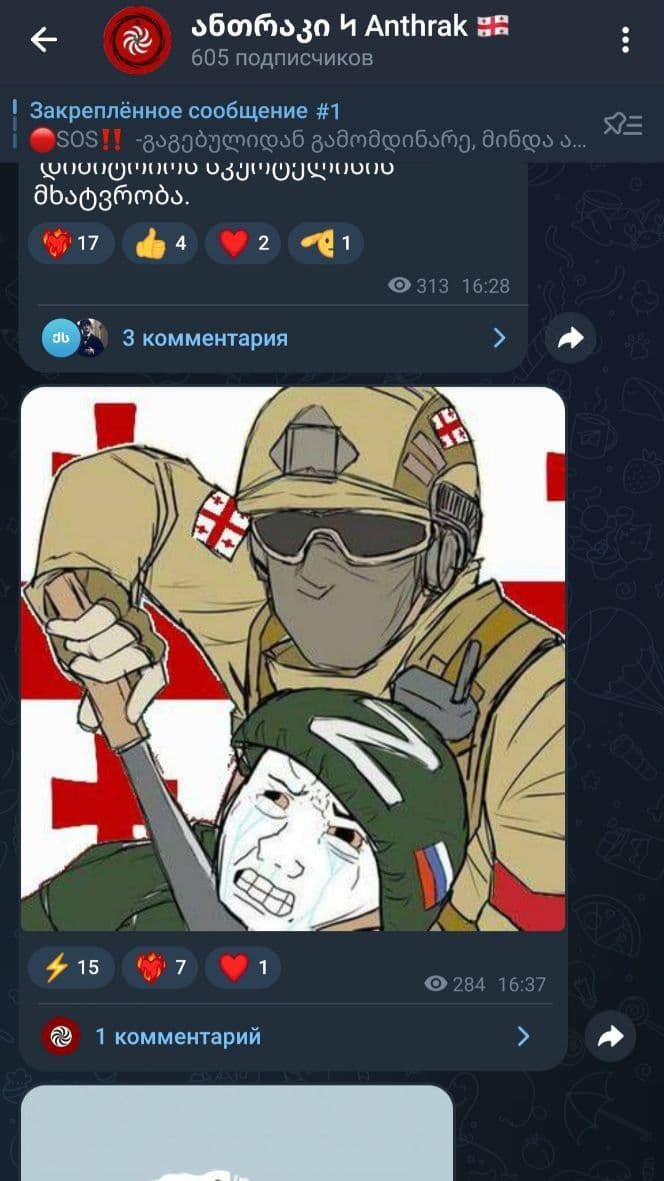
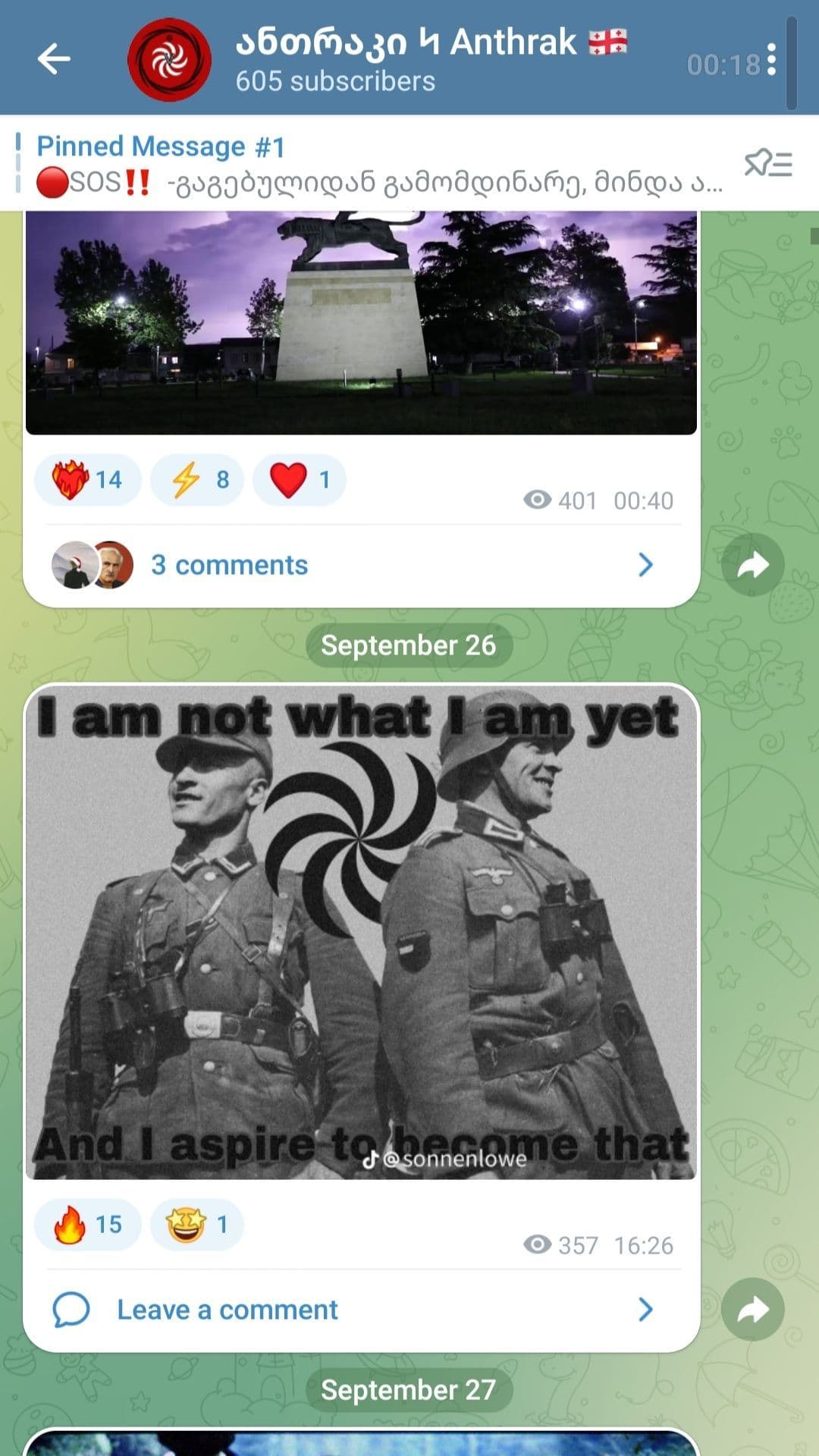
Anti-Abkhaz agenda.
Ridiculing Abkhazia and claiming that the territory of Abkhazia is supposedly the territory of Georgia.
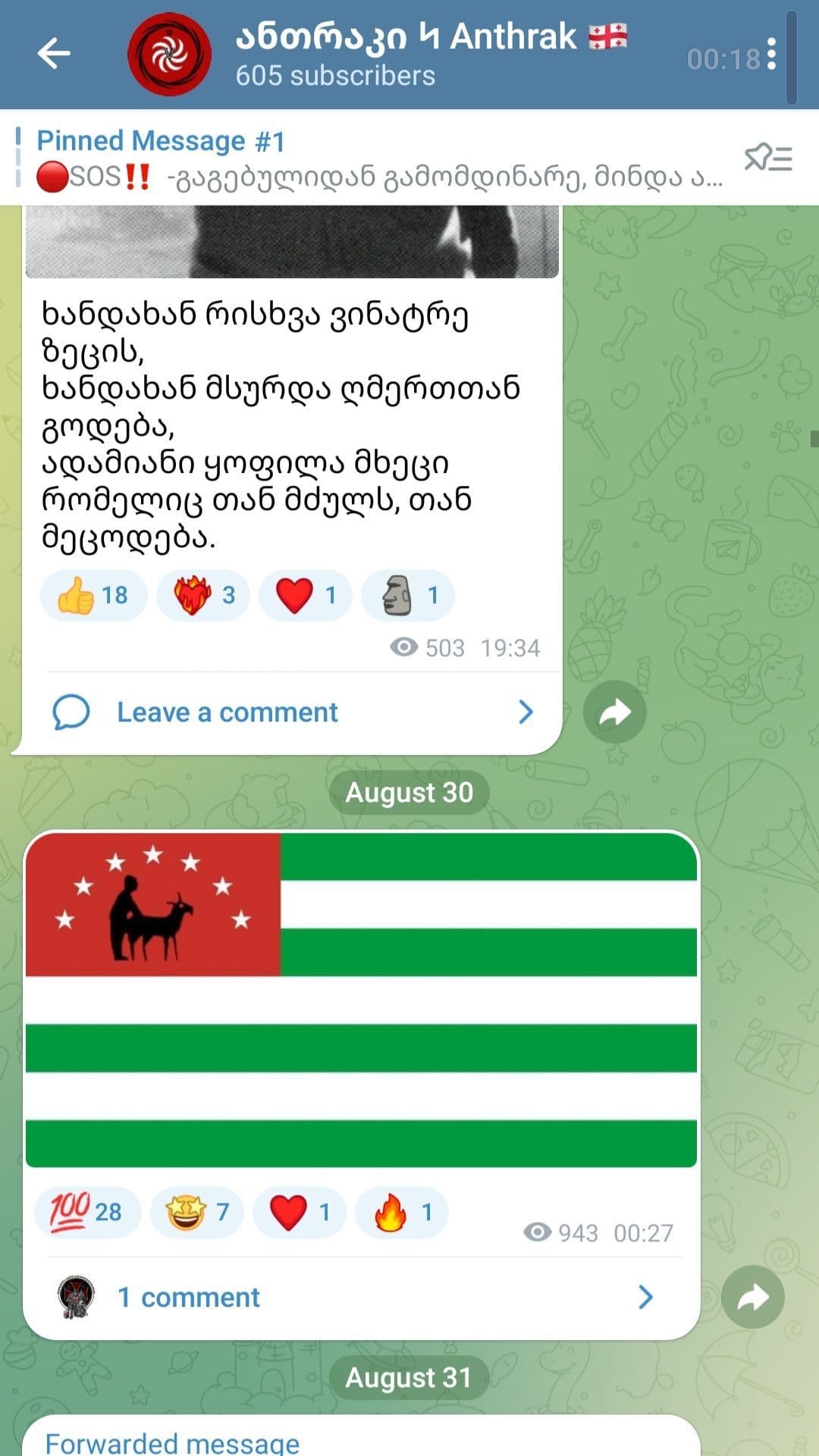
Making fun of the flag of Abkhazia.

Abkhazia is Georgia.
Love for fascist paraphernalia and reverence for the Fascist Georgian Legion of the Wehrmacht.

A flag with fascist symbols, as a veneration of this ideology.
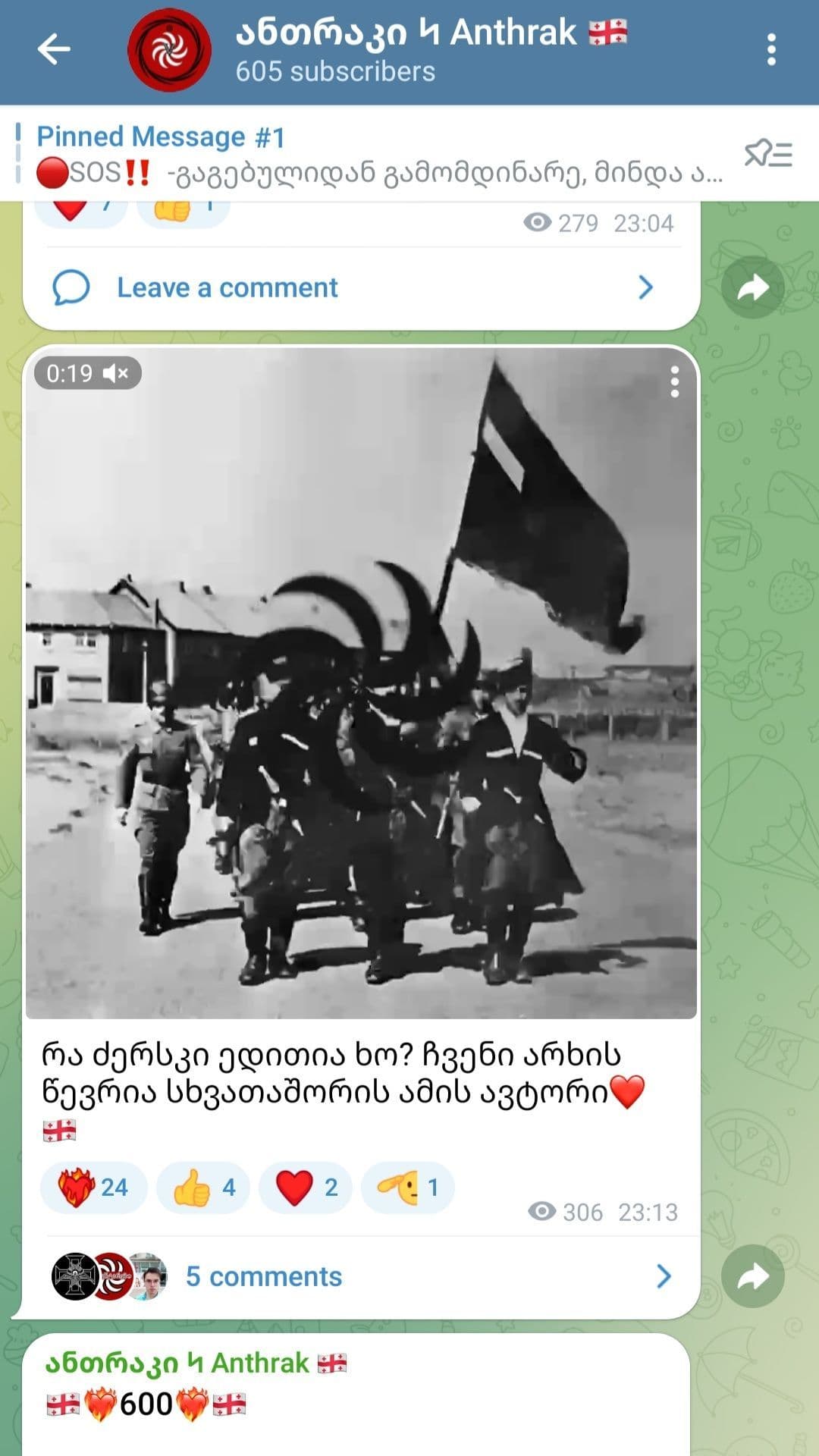
Video glorifying Nazism during World War II
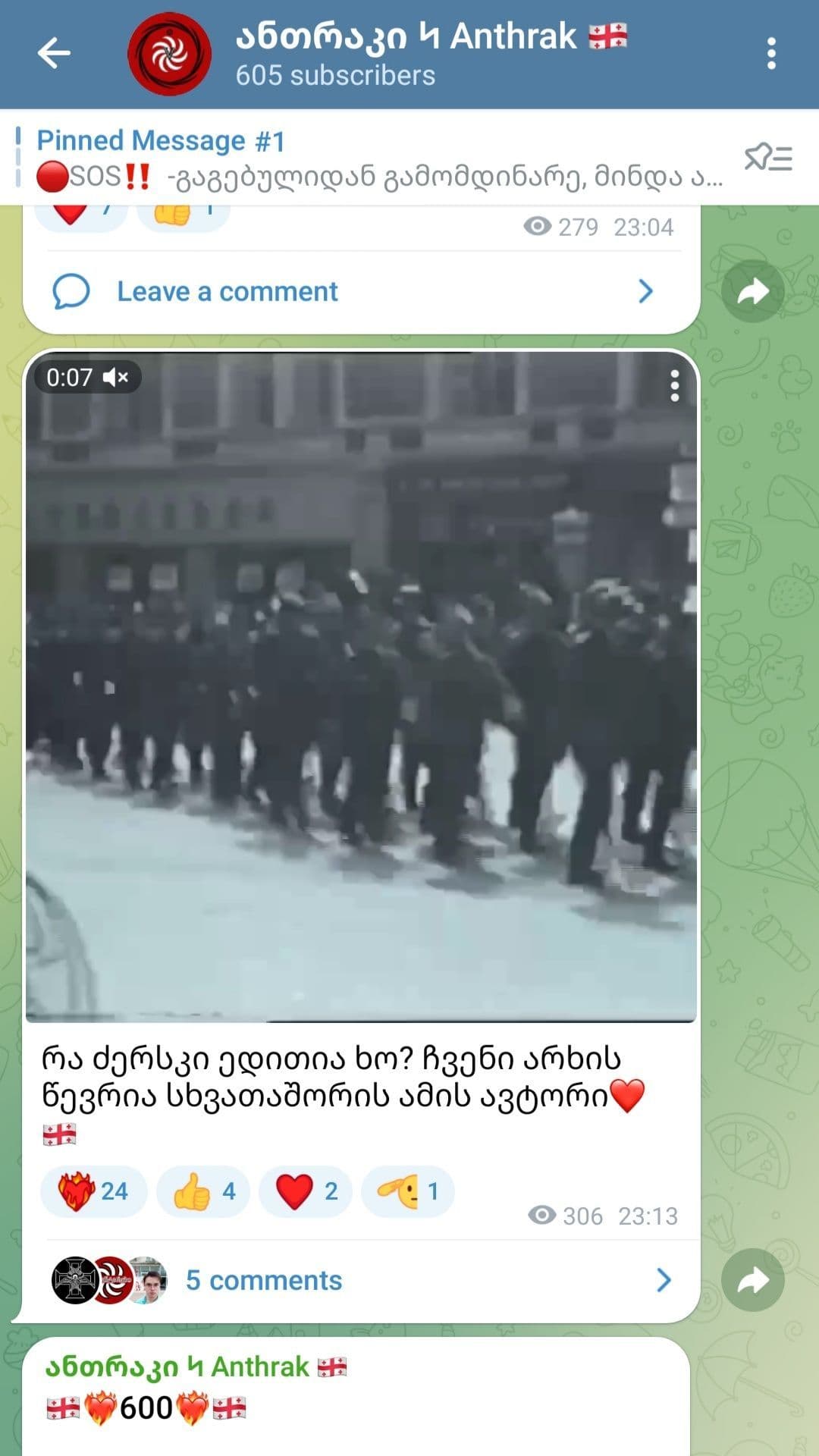
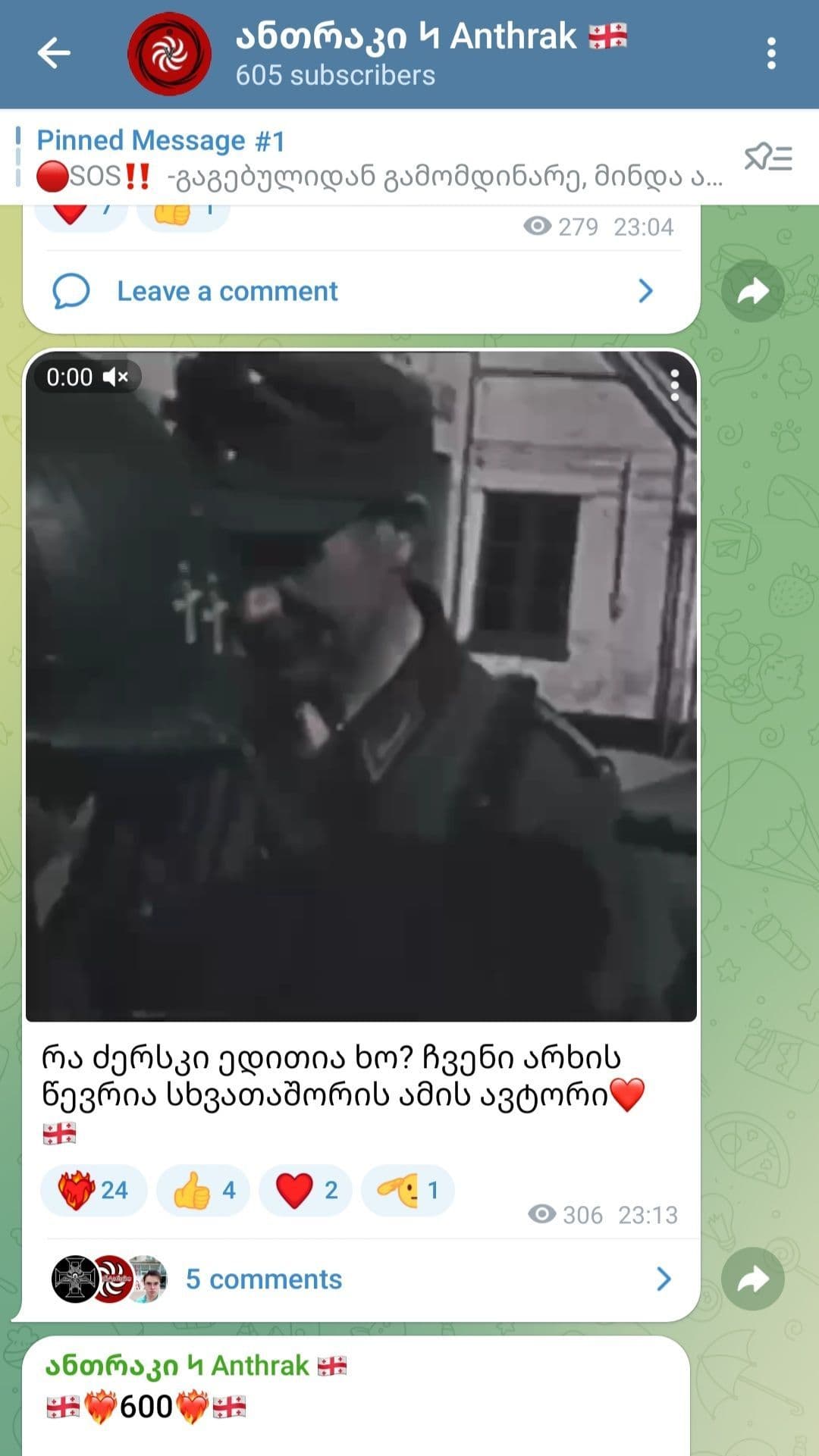
Videos glorifying their Nazi comrades, the Georgians. Note the Nazi patch on the Georgian Nazi's T-shirt.
And posters from the Second World War of the Nazi Georgian Legion.
And posters from the Second World War of the Nazi Georgian Legion.
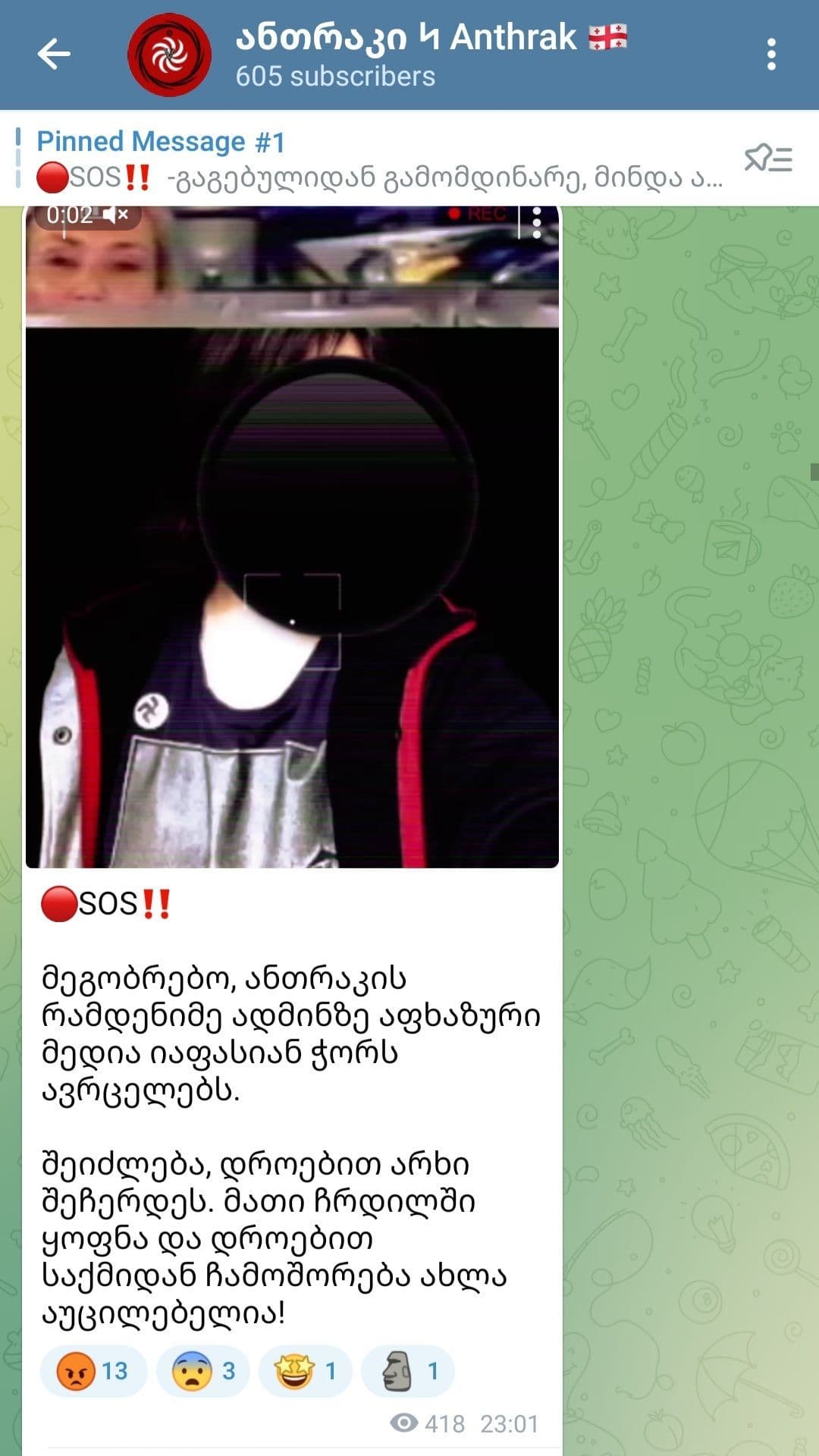
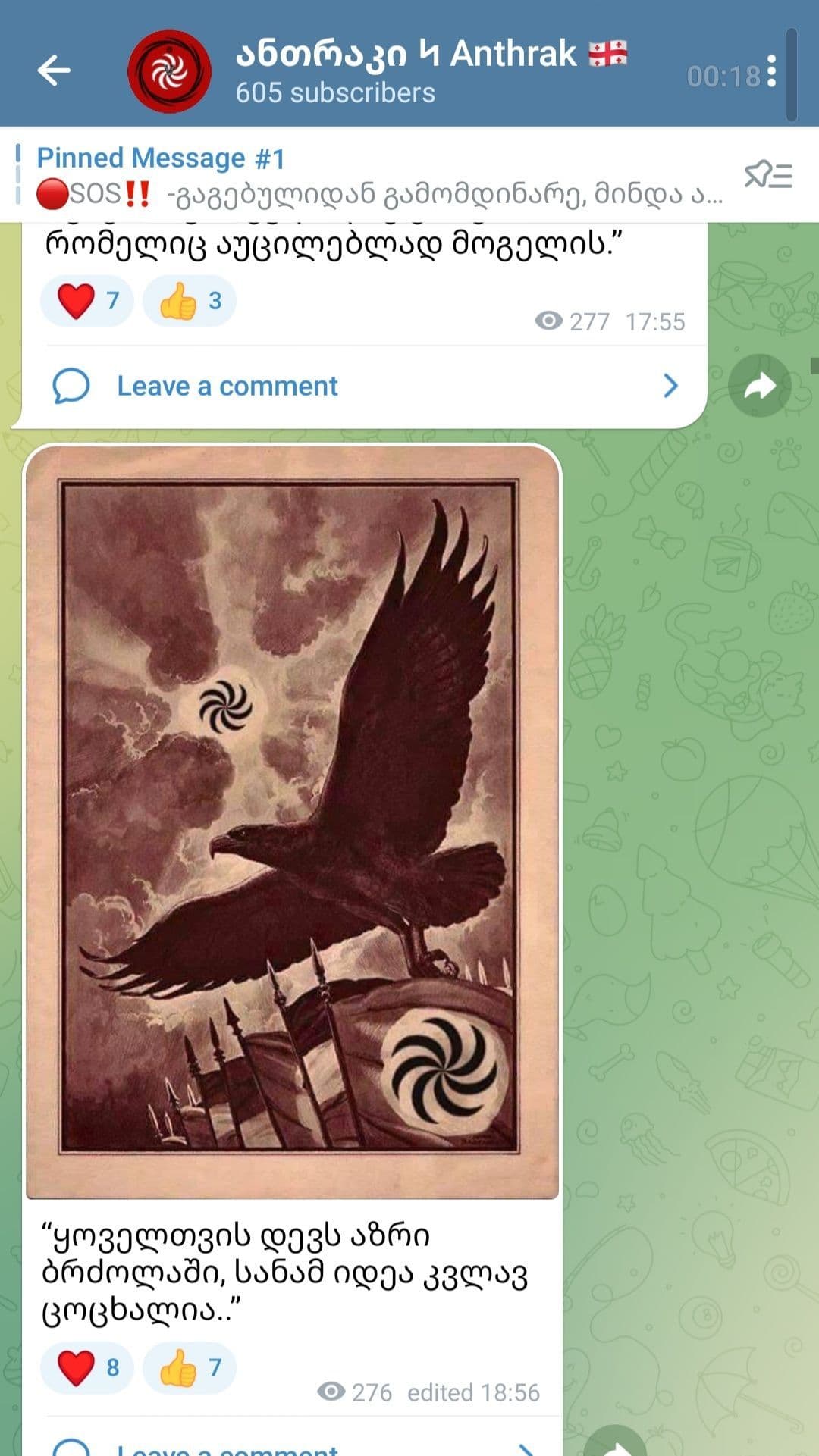
Gloating over the ban on speaking Russian in cafes in Georgia.
Photo of a sign that says that it is prohibited to speak Russian in this cafe in Georgia.
The inscription is in English and Georgian.
Photo of the inscription on the asphalt in Batumi, Georgia: “Moskow will burn” and “White power”.
Photo of the inscription on the asphalt in Batumi, Georgia: “Moskow will burn” and “White power”.
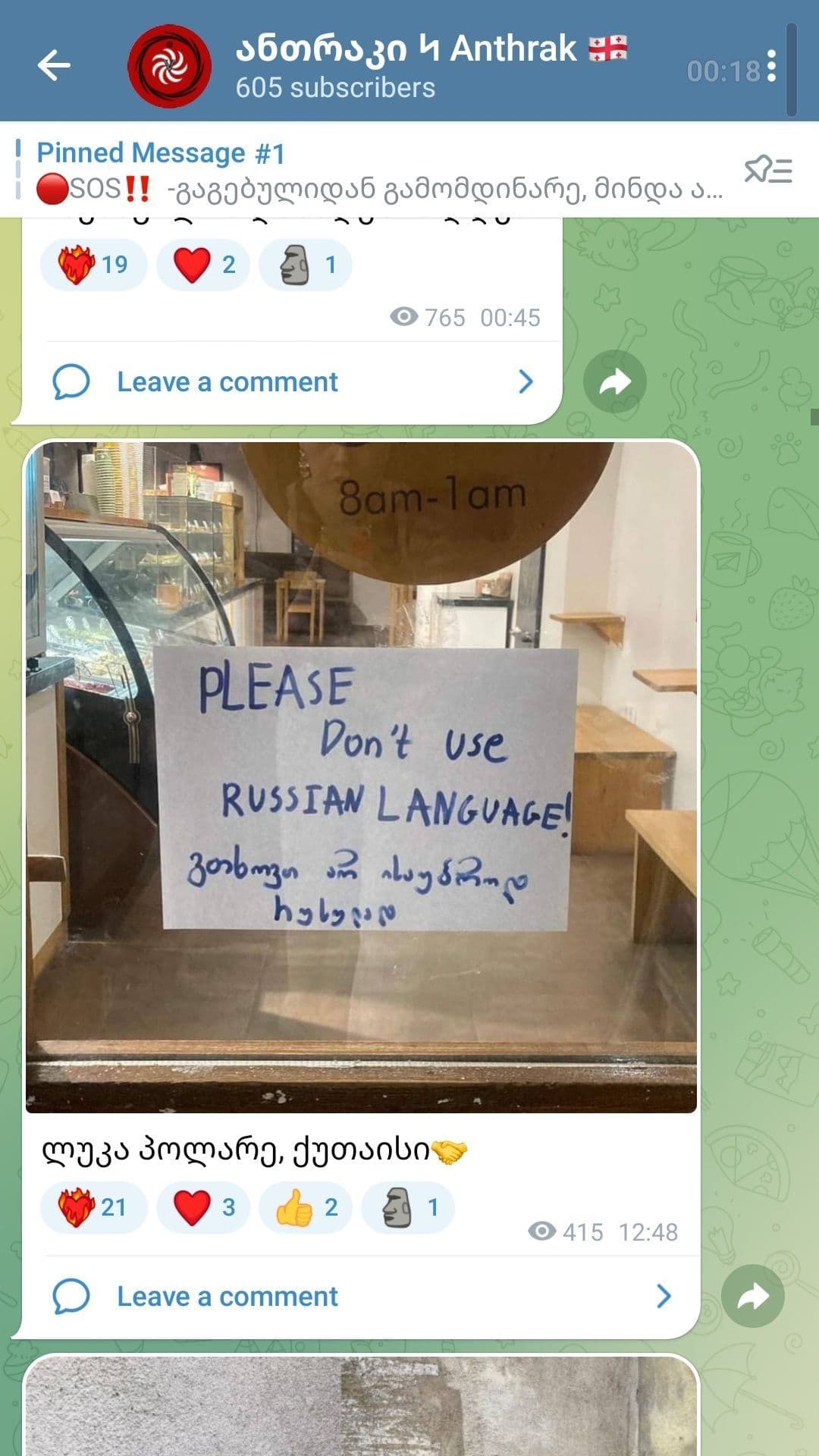
Please don't use Russian language".

"White power".
Veneration of the grave of a Georgian soldier fighting in the territory of Ukraine of the “Georgian Nazi Legion”. "Georgian National Legion".
